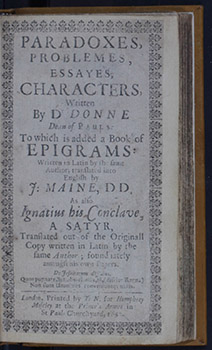
PARADOXES,
PROBLEMES,
ESSAYES,
CHARACTERS,
Written
By Dr DONNE
Dean of PAULS:
To which is added a Book of
EPIGRAMS:
Written in Latin by the same
Author; translated into
English by
I: MAINE, D. D.
As also
Ignatius his Conclave,
A SATYR,
Translated out of the Originall
Copy written in Latin by the
same Author; found
lately amongst his own Papers. Quos pugnare, Scholis, clamāt, hi, (discite Regna) Non sunt Unanimes, conveniuntq;qie nimis.
Printed by T: N: for Humphrey
Moseley at the Prince's Armes in
St Pauls Churchyard, 1652
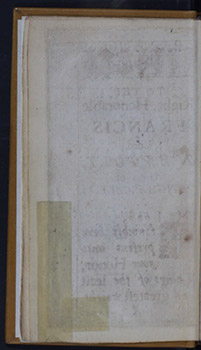
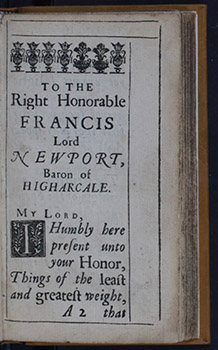
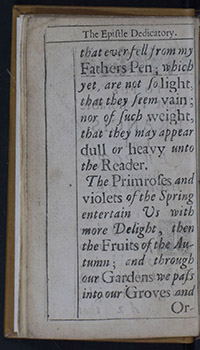
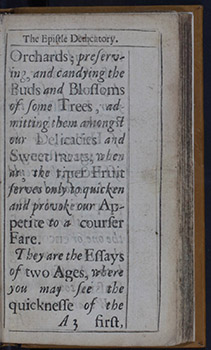
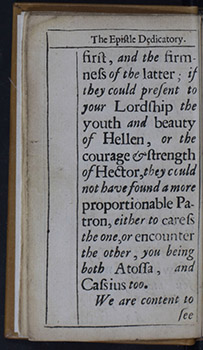
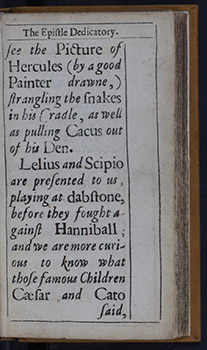
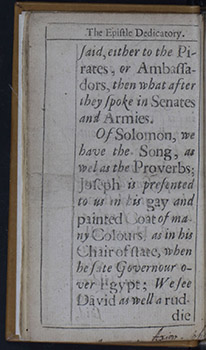
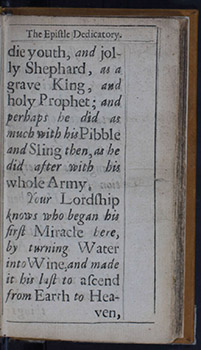
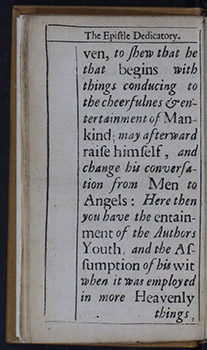
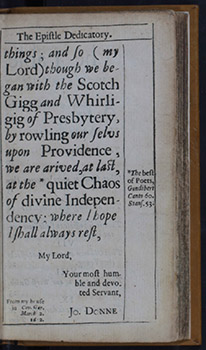
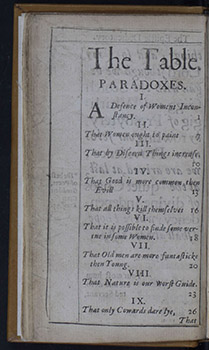 The Table.
PARADOXES.
I.
The Table.
PARADOXES.
I. A Defence of Womens Incon-
stancy. 1 II.
That Women ought to paint 7 III.
That by Discord Things increase. 10 IV.
That Good is more common then
Evill 13 V.
That all things kill themselves 16 VI.
That it is possible to finde some ver-
tue in some Women. 18 VII.
That Old men are more fantasticke
then Young. 20 VIII.
That Nature is our worst Guide. 23 IX.
That only Cowards dare lye, 26 That
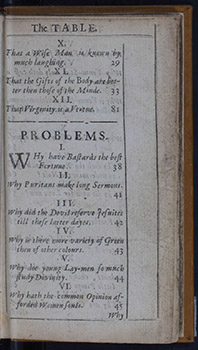 The Table
X.
The Table
X. That a Wise Man is known by
much laughing. 29 XI.
That the Gifts of the Body are bet-
ter then those of the Minde. 33 XII.
That Virginity is a Vertue. 81 PROBLEMS. I.
WHyWhy have Bastards the best
Fortune. 38 II.
Why Puritans make long Sermons. 41 III.
Why did the Devil reserve Iesuites
till these latter dayes. 42 IV.
Why is there more variety of Green
then of other colours. 43 V.
Why doe young Lay-men so much
study Divinity. 44 VI.
Why hath the common Opinion af-
forded Women souls. 45 Why
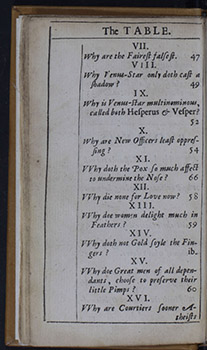 The Table
VII.
The Table
VII. Why are the Fairest falsest. 47 VIII.
Why Venus-Star only doth cast a
shadow? 49 IX.
Why is Venus-star multinominous,
called both Hesperus & Vesper? 52 X.
Why are New Officers least oppres-
sing? 54 XI.
VVhyWhy doth the Pox so much affect
to undermine the Nose? 66 XII.
VVhyWhy die none for Love now? 58 XIII.
VVhyWhy doe women delight much in
Feathers? 59 XIV.
VVhyWhy doth not Gold soyle the Fin-
gers? ib. XV.
VVhyWhy doe Great men of all depen-
dants, choose to preserve their
little Pimps? 60 XVI.
VVhyWhy are Courtiers sooner A-
theists
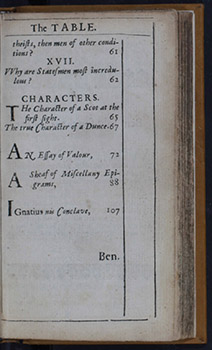 The Table
theists, then men of other condi-
The Table
theists, then men of other condi-tions? 61 XVII.
VVhyWhy are Statesmen most incredu-
lous? 62 CHARACTERS. THeThe Character of a Scot at the
first sight. 65 The true Character of a Dunce. 67 ANAn Essay of Valour, 72 A Sheaf of Miscellany Epi-
grams, 88 IGnatiusIgnatius nis Conclave, 107
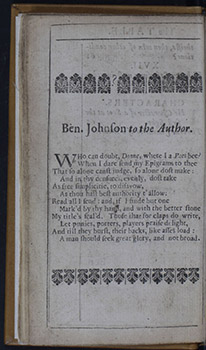 Ben. Johnson to the Author.
WHoWho can doubt, Donne, where I a Poet bee?
When I dare send my Epigrams to thee
That so alone canst judge, so alone dost make:
And in thy censures, evenly, dost take
As free simplicitie, to disavow,
As thou hast best authority t'allow:
Read all I send: and, if I finde but one
Mark'd by thy hand, and with the better stone
My title's seal'd. Those that for claps do write,
Let punies, porters, players praise delight,
And till they burst, their backs, like asses load:
A man should seek great glory, and not broad.
Ben. Johnson to the Author.
WHoWho can doubt, Donne, where I a Poet bee?
When I dare send my Epigrams to thee
That so alone canst judge, so alone dost make:
And in thy censures, evenly, dost take
As free simplicitie, to disavow,
As thou hast best authority t'allow:
Read all I send: and, if I finde but one
Mark'd by thy hand, and with the better stone
My title's seal'd. Those that for claps do write,
Let punies, porters, players praise delight,
And till they burst, their backs, like asses load:
A man should seek great glory, and not broad.
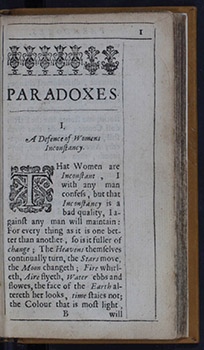 1
PARADOXES.
I.
1
PARADOXES.
I.
A Defence of Womens
Inconstancy.
THhat Women are
Inconstant, I
with any man
confess, but that
Inconstancy is a
bad quality, I a-
gainst any man will maintain:
For every thing as it is one bet-
ter than another, so is it fuller of
change; The Heavens themselves
continually turn, the Stars move,
the Moon changeth; Fire whirl-
eth, Aire flyeth, Water ebbs and
flowes, the face of the Earth al-
tereth her looks, time staies not;
the Colour that is most light,
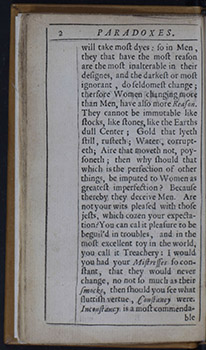 2
PARADOXES.
2
PARADOXES.
will take most dyes: so in Men,
they that have the most reason
are the most inalterable in their
designes, and the darkest or most
ignorant, do seldomest change;
therfore Women changing more
than Men, have also more Reason.
They cannot be immutable like
stocks, like stones, like the Earths
dull Center; Gold that lyeth
still, rusteth; Water, corrupt-
eth; Aire that moveth not, poy-
soneth; then why should that
which is the perfection of other
things, be imputed to Women as
greatest imperfection? Because
thereby they deceive Men. Are
not your wits pleased with those
jests, which cozen your expecta-
tion? You can cal it pleasure to be
beguil'd in troubles, and in the
most excellent toy in the world,
you call it Treachery: I would
you had your Mistresses so con-
stant, that they would never
change, no not so much as their
smocks, then should you see what
sluttish vertue, Constancy were.
Inconstancy is a most commenda-
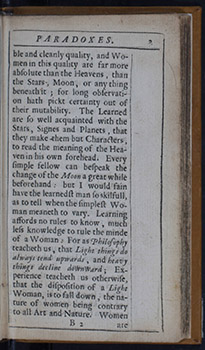 PARADOXES.
3
ble and cleanly quality, and Wo-
PARADOXES.
3
ble and cleanly quality, and Wo-men in this quality are far more
absolute than the Heavens, than
the Stars, Moon, or any thing
beneath it; for long observati-
on hath pickt certainty out of
their mutability. The Learned
are so well acquainted with the
Stars, Signes and Planets, that
they make them but Characters,
to read the meaning of the Hea-
ven in his own forehead. Every
simple fellow can bespeak the
change of the Moon a great while
beforehand: but I would fain
have the learnedst man so skilfull,
as to tell when the simplest Wo-
man meaneth to vary. Learning
affords no rules to know, much
less knowledge to rule the minde
of a Woman: For as Philosophy
teacheth us, that Light things do
always tend upwards, and heavy
things decline downward; Ex-
perience teacheth us otherwise,
that the disposition of a Light
Woman, is to fall down, the na-
ture of women being contrary
to all Art and Nature. Women
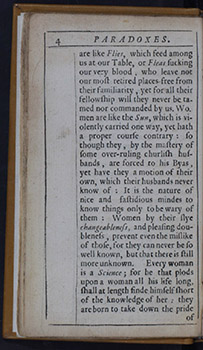 4
PARADOXES.
4
PARADOXES.
are like Flies, which feed among
us at our Table, or Fleas sucking
our very blood., who leave not
our most retired places free from
their familiarity, yet for all their
fellowship will they never be ta-
med nor commanded by us. Wo-
men are like the Sun, which is vi-
olently carried one way, yet hath
a proper course contrary: so
though they, by the mastery of
some over-ruling churlish hus-
bands, are forced to his Byas,
yet have they a motion of their
own, which their husbands never
know of: It is the nature of
nice and fastidious mindes to
know things only to be wary of
them: Women by their slye
changeableness, and pleasing dou-
bleness, prevent even the mislike
of those, for they can never be so
well known, but that there is still
more unknown. Every woman
is a Science; for he that plods
upon a woman all his life long,
shall at length finde himself short
of the knowledge of her: they
are born to take down the pride
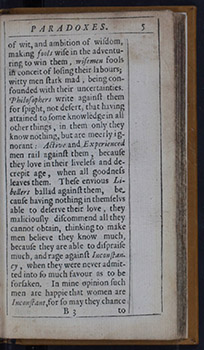 PARADOXES.
5
of wit, and ambition of wisdom,
PARADOXES.
5
of wit, and ambition of wisdom,
making fools wise in the adventu-
ring to win them, wisemen fools
in conceit of losing their labours;
witty men stark mad, being con-
founded with their uncertainties.
Philosophers write against them
for spight, not desert, that having
attained to some knowledge in all
other things, in them only they
know nothing, but are meerly ig-
norant: Active and Experienced
men rail against them, because
they love in their liveless and de-
crepit age, when all goodness
leaves them. These envious Li-
bellers ballad against them, be-
cause having nothing in themselvs
able to deserve their love, they
maliciously discommend all they
cannot obtain, thinking to make
men believe they know much,
because they are able to dispraise
much, and rage against Inconstan-
cy, when they were never admit-
ted into so much favour as to be
forsaken. In mine opinion such
men are happie that women are
Inconstant, for so may they chance
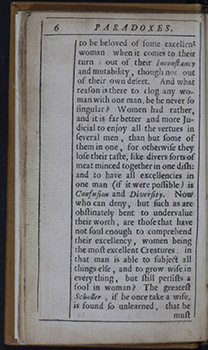 6
PARADOXES.
to be beloved of some excellent
6
PARADOXES.
to be beloved of some excellent
woman when it comes to their
turn out of their Inconstancy
and mutability, though not out
of their own desert. And what
reason is there to clog any wo-
man with one man, be he never so
singular? Women had rather,
and it is far better and more Ju-
dicial to enjoy all the vertues in
several men, than but some of
them in one, for otherwise they
lose their taste, like divers sorts of
meat minced together in one dish:
and to have all excellencies in
one man (if it were possible) is
Confusion and Diversity. Now
who can deny, but such as are
obstinately bent to undervalue
their worth, are those that have
not soul enough to comprehend
their excellency, women being
the most excellent Creatures, in
that man is able to subject all
things else, and to grow wise in
every thing, but still persists a
fool in woman? The greatest
Scholler, if he once take a wife,
is found so unlearned, that he
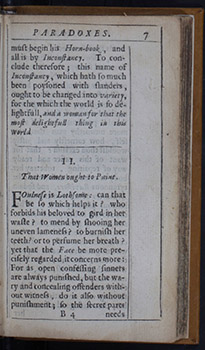 PARADOXES.
7
must begin his Horn-book, and
PARADOXES.
7
must begin his Horn-book, and
all is by Inconstancy. To con-
clude therefore; this name of
Inconstancy, which hath so much
been poysoned with slanders,
ought to be changed into variety,
for the which the world is so de-
lightfull, and a woman for that the
most delightfull thing in this
world.
II. That Women ought to Paint.
FOoulness is Lothsome: can that
be so which helps it? who
forbids his beloved to gird in her
waste? to mend by shooing her
uneven lameness? to burnish her
teeth? or to perfume her breath?
yet that the Face be more pre-
cisely regarded, it concerns more:
For as open confessing sinners
are always punished, but the wa-
ry and concealing offenders with-
out witness, do it also without
punishment; so the secret parts
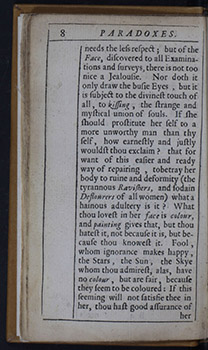 8
PARADOXES.
needs the less respect; but of the
8
PARADOXES.
needs the less respect; but of the
Face, discovered to all Examina-
tions and surveys, there is not too
nice a Jealousie. Nor doth it
only draw the busie Eyes, but it
is subject to the divinest touch of
all, to kissing, the strange and
mystical union of souls. If she
should prostitute her self to a
more unworthy man than thy
self, how earnestly and justly
wouldst thou exclaim? that for
want of this easier and ready
way of repairing, to betray her
body to ruine and deformity (the
tyrannous Ravishers, and sodain
Deflourers of all women) what a
hainous adultery is it? What
thou lovest in her face is colour,
and painting gives that, but thou
hatest it, not because it is, but be-
cause thou knowest it. Fool,
whom ignorance makes happy,
the Stars, the Sun, the Skye
whom thou admirest, alas, have
no colour, but are fair, because
they seem to be coloured: If this
seeming will not satisfie thee in
her, thou hast good assurance of
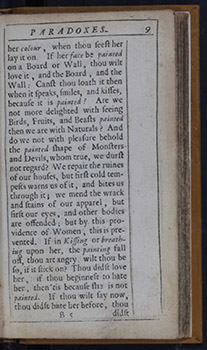 PARADOXES.
9
her colour, when thou seest her
PARADOXES.
9
her colour, when thou seest her
lay it on. If her face be painted
on a Board or Wall, thou wilt
love it, and the Board, and the
Wall: Canst thou loath it then
when it speaks, smiles, and kisses,
because it is painted? Are we
not more delighted with seeing
Birds, Fruits, and Beasts painted
then we are with Naturals? And
do we not with pleasure behold
the painted shape of Monsters
and Devils, whom true, we durst
not regard? We repair the ruines
of our houses, but first cold tem-
pests warns us of it, and bites us
through it; we mend the wrack
and stains of our apparel, but
first our eyes, and other bodies
are offended; but by this pro-
vidence of Women, this is pre-
vented. If in Kissing or breath-
ing upon her, the painting fall
off, thou art angry, wilt thou be
so, if it stick on? Thou didst love
her, if thou beginnest to hate
her, then 'tis because she is not
painted. If thou wilt say now,
thou didst hate her before, thou
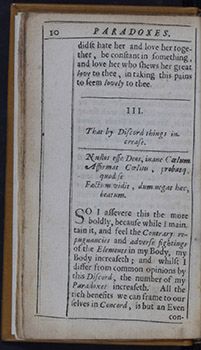 10
PARADOXES.
didst hate her and love her toge-
10
PARADOXES.
didst hate her and love her toge-ther, be constant in something,
and love her who shews her great
love to thee, in taking this pains
to seem lovely to thee. III.
That by Discord things in-
crease.
Nullos esse Deos, inane Cœlum
Affirmat Cœlius, probatqque
quod se
Factum vidit, dum negat hæc,
beatum.
SOo I assevere this the more
boldly, because while I main-
tain it, and feel the Contrary re-
pugnancies and adverse fightings
of the Elements in my Body,
my Body increaseth; and whilst I
differ from common opinions by
this Discord, the number of my
Paradoxes increaseth. All the
rich benefits we can frame to our
selves in Concord, is but an Even
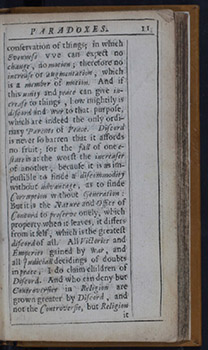 PARADOXES.
11
conservation of things; in which
PARADOXES.
11
conservation of things; in which
Evenness vvwe can expect no
change, no motion; therefore no
increase or augmentation, which
is a member of motion. And if
this unity and peace can give in-
crease to things, how mightily is
discord and war to that purpose,
which are indeed the only ordi-
nary Parents of Peace. Discord
is never so barren that it affords
no fruit; for the fall of one e-
state is at the worst the increaser
of another, because it is as im-
possible to finde a discommodity
without advantage, as to finde
Corruption without Generation:
But it is the Nature and Office of
Concord to preserve onely, which
property when it leaves, it differs
from it self, which is the greatest
discord of all. All Victories and
Emperies gained by war, and
all Judiciall decidings of doubts
in peace, I do claim children of
Discord. And who can deny but
Controversies in Religion are
grown greater by Discord, and
not the Controversie, but Religion
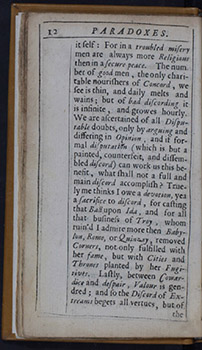 12
PARADOXES.
it self: For in a troubled misery
12
PARADOXES.
it self: For in a troubled misery
men are always more Religious
then in a secure peace. The num-
ber of good men, the only chari-
table nourishers of Concord, we
see is thin, and daily melts and
wains; but of bad discording it
is infinite, and growes hourly.
We are ascertained of all Dispu-
table doubts, only by arguing and
differing in Opinion, and if for-
mal disputation (which is but a
painted, counterfeit, and dissem-
bled discord) can work us this be-
nefit, what shall not a full and
main discord accomplish? True-
ly me thinks I owe a devotion, yea
a sacrifice to discord, for casting
that Ball upon Ida, and for all
that business of Troy, whom
ruin'd I admire more then Baby-
lon, Rome, or Quinzay, removed
Corners, not only fulfilled with
her fame, but with Cities and
Thrones planted by her Fugi-
tives. Lastly, between Cowar-
dice and despair, Valour is gen-
dred; and so the Discord of Ex-
treams begets all vertues, but of
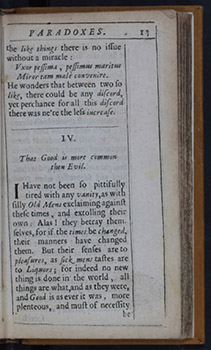 PARADOXES.
13
PARADOXES.
13
the like things there is no issue
without a miracle:
VUxor pessima, pessimus maritus
Miror tam malè convenire.
He wonders that between two so
like, there could be any discord,
yet perchance for all this discord
there was ne're the less increase. IV.
That Good is more common
then Evil.
I Havehave not been so pittifully
tired with any vanity, as with
silly Old Mens exclaiming against
these times, and extolling their
own: Alas! they betray them-
selves, for if the times be changed,
their manners have changed
them. But their senses are to
pleasures, as sick mens tastes are
to Liquors; for indeed no new
thing is done in the world, all
things are what, and as they were,
and Good is as ever it was, more
plenteous, and must of necessity
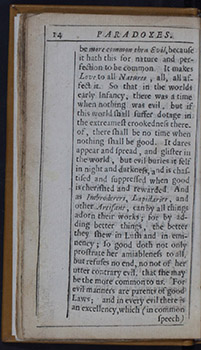 14
PARADOXES.
14
PARADOXES.
be more common then Evil, because
it hath this for nature and per-
fection to be common. It makes
Love to all Natures, all, all af-
fect it. So that in the worlds
early Infancy, there was a time
when nothing was evil, but if
this world shall suffer dotage in
the extreamest crookedness there-
of, there shall be no time when
nothing shall be good. It dares
appear and spread, and glister in
the world, but evil buries it self
in night and darkness, and is chas-
tised and suppressed when good
is cherished and rewarded. And
as Imbroderers, Lapidaries, and
other Artisans, can by all things
adorn their works; for by ad-
ding better things, the better
they shew in Lush and in emi-
nency; so good doth not only
prostrate her amiableness to all,
but refuses no end, no not of her
utter contrary evil, that she may
be the more common to us. For
evil manners are parents of good
Laws; and in every evil there is
an excellency, which (in common
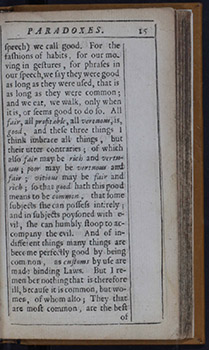 PARADOXES.
15
speech) we call good. For the
PARADOXES.
15
speech) we call good. For the
fashions of habits, for our mo-
ving in gestures, for phrases in
our speech, we say they were good
as long as they were used, that is
as long as they were common;
and we eat, we walk, only when
it is, or seems good to do so. All
fair, all profitable, all vertuous, is,
good, and these three things I
think imbrace all things, but
their utter contraries; of which
also fair may be rich and vertu-
ous; poor may be vertuous and
fair; vitious may be fair and
rich; so that good hath this good
means to be common, that some
subjects she can possess intirely;
and in subjects poysoned with e-
vil, she can humbly stoop to ac-
company the evil. And of in-
different things many things are
become perfectly good by being
common, as customs by use are
made binding Laws. But I re-
member nothing that is therefore
ill, because it is common, but wo-
men, of whom also; They that
are most common, are the best
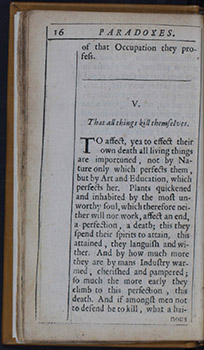 16
PARADOXES.
of that Occupation they pro-
16
PARADOXES.
of that Occupation they pro-fess.
V.
That all things kill themselves.
TOo affect, yea to effect their
own death all living things
are importuned, not by Na-
ture only which perfects them,
but by Art and Education, which
perfects her. Plants quickened
and inhabited by the most un-
worthy soul, which therefore nei-
ther will nor work, affect an end,
a perfection, a death; this they
spend their spirits to attain, this
attained, they languish and wi-
ther. And by how much more
they are by mans Industry war-
med, cherished and pampered;
so much the more early they
climb to this perfection, this
death. And if amongst men not
to defend be to kill, what a hai-
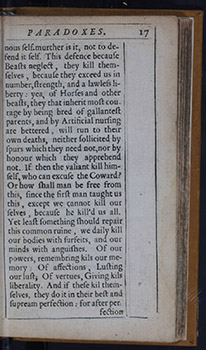 PARADOXES.
17
nous self-murther is it, not to de-
PARADOXES.
17
nous self-murther is it, not to de-fend itself. This defence because
Beasts neglect, they kill them-
selves, because they exceed us in
number, strength, and a lawless li-
berty: yea, of Horses and other
beasts, they that inherit most cou-
rage by being bred of gallantest
parents, and by Artificial nursing
are bettered, will run to their
own deaths, neither sollicited by
spurs which they need not, nor by
honour which they apprehend
not. If then the valiant kill him-
self, who can excuse the Coward?
Or how shall man be free from
this, since the first man taught us
this, except we cannot kill our
selves, because he kill'd us all.
Yet least something should repair
this common ruine, we daily kill
our bodies with surfeits, and our
minds with anguishes. Of our
powers, remembring kils our me-
mory: Of affections, Lusting
our lust; Of vertues, Giving kils
liberality. And if these kil them-
selves, they do it in their best and
supream perfection: for after per-
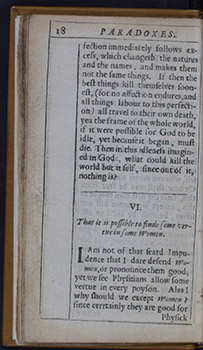 18
PARADOXES.
fection immediately follows ex-
18
PARADOXES.
fection immediately follows ex-cess, which changeth the natures
and the names, and makes them
not the same things. If then the
best things kill themselves soon-
est, (for no affection endures, and
all things labour to this perfecti-
on) all travel to their own death,
yea the frame of the whole world,
if it were possible for God to be
idle, yet because it began, must
die. Then in this idleness imagin-
ed in God, what could kill the
world but it self, since out of it,
nothing is?
VI.
That it is possible to finde some ver-
tue in some Women.
I Aam not of that seard Impu-
dence that I dare defend Wo-
men, or pronounce them good,
yet we see Physitians allow some
vertue in every poyson. Alas!
why should we except Women?
since cerrtainly they are good for
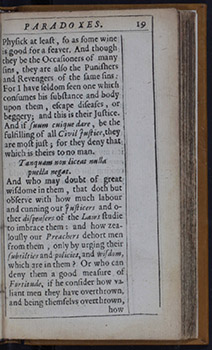 PARADOXES.
19
Physick at least, so as some wine
PARADOXES.
19
Physick at least, so as some wine
is good for a feaver. And though
they be the Occasioners of many
sins, they are also the Punishers
and Revengers of the same sins:
For I have seldom seen one which
consumes his substance and body
upon them, escape diseases, or
beggery; and this is their Justice.
And if suum cuique dare, be
the fulfilling of all Civil Justice, they
are most just; for they deny that
which is theirs to no man.
Tanquam non liceat nulla
puella negat.
And who may doubt of great
wisdome in them, that doth but
observe with how much labour
and cunning our Justicers and o-
ther dispensers of the Laws studie
to imbrace them: and how zea-
lously our Preachers dehort men
from them, only by urging their
subtilties and policies, and wisdom,
which are in them? Or who can
deny them a good measure of
Fortitude, if he consider how va-
liant men they have overthrown,
and being themselvs overthrown,
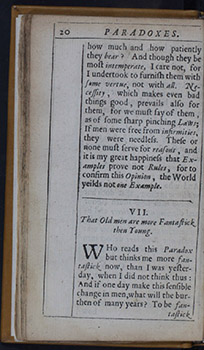 20
PARADOXES.
how much and how patiently
20
PARADOXES.
how much and how patiently
they bear? And though they be
most intemperate, I care not, for
I undertook to furnish them with
some vertue, not with all. Ne-
cessity, which makes even bad
things good, prevails also for
them, for we must say of them,
as of some sharp pinching Laws;
If men were free from infirmities,
they were needless. These or
none must serve for reasons, and
it is my great happiness that Ex-
amples prove not Rules, for to
confirm this Opinion, the World
yeilds not one Example.
VII.
That Old men are more Fantastick
then Young.
WHho reads this Paradox
but thinks me more fan-
tastick now, than I was yester-
day, when I did not think thus:
And if one day make this sensible
change in men, what will the bur-
then of many years? To be fan-
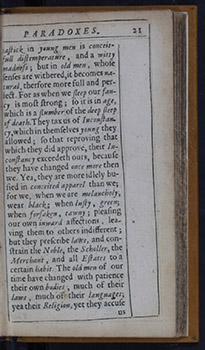 PARADOXES.
21
tastick
in young men is conceit-
PARADOXES.
21
tastick
in young men is conceit-full distemperature, and a witty
madness; but in old men, whose
senses are withered, it becomes na-
tural, therfore more full and per-
fect. For as when we sleep our fan-
cy is most strong; so it is in age,
which is a slumber of the deep sleep
of death. They tax us of Inconstan-
cy, which in themselves young they
allowed; so that reproving that
which they did approve, their In-
constancy exceedeth ours, because
they have changed once more then
we. Yea, they are more idlely bu-
sied in conceited apparel than we;
for we, when we are melancholy,
wear black; when lusty, green;
when forsaken, tawny; pleasing
our own inward affections, lea-
ving them to others indifferent;
but they prescribe laws, and con-
strain the Noble, the Scholler, the
Merchant, and all Estates to a
certain habit. The old men of our
time have changed with patience
their own bodies, much of their
laws, much of their languages;
yea their Religion, yet they accuse
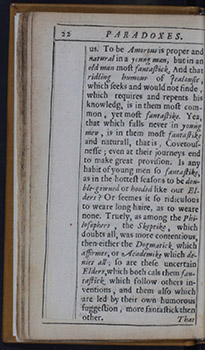 22
PARADOXES.
us. To be Amorous is proper and
22
PARADOXES.
us. To be Amorous is proper and
natural in a young man, but in an
old man most fantastick. And that
ridling humour of Jealousie,
which seeks and would not finde,
which requires and repents his
knowledg, is in them most com-
mon, yet most fantastike. Yea,
that which falls never in young
men, is in them most fantastike
and naturall, that is, Covetous-
nesse; even at their journeys end
to make great provision. Is any
habit of young men so fantastike,
as in the hottest seasons to be dou-
ble-gowned or hooded like our El-
ders? Or seemes it so ridiculous
to weare long haire, as to weare
none. Truely, as among the Phi-
losophers, the Skeptike, which
doubts all, was more contentious,
then either the Dogmatick which
affirmes, or Academike which de-
nies all; so are these uncertain
Elders, which both cals them fan-
tastick which follow others in-
ventions, and them also which
are led by their own humorous
suggestion, more fantastick then
other.
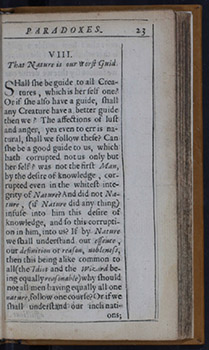 PARADOXES.
23
VIII.
PARADOXES.
23
VIII.
That Nature is our Worst Guid.
SHhall she be guide to all Crea-
tures, which is her self one?
Or if she also have a guide, shall
any Creature have a better guide
then we? The affections of lust
and anger, yea even to err is na-
tural, shall we follow these? Can
she be a good guide to us, which
hath corrupted not us only but
her self? was not the first Man,
by the desire of knowledge, cor-
rupted even in the whitest inte-
grity of Nature? And did not Na-
ture, (if Nature did any thing)
infuse into him this desire of
knowledge, and so this corrupti-
on in him, into us? If by Nature
we shall understand our essence,
our definition or reason, nobleness,
then this being alike common to
all (the Idiot and the Wizard be-
ing equally reasonable) why should
not all men having equally all one
nature,follow one course? Or if we
shall understand our inclinati-
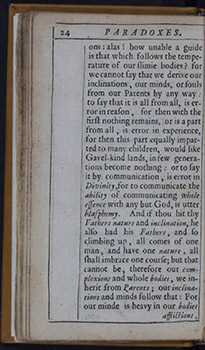 24
PARADOXES.
ons: alas! how unable a guide
24
PARADOXES.
ons: alas! how unable a guide
is that which follows the tempe-
rature of our slimie bodies? for
we cannot say that we derive our
inclinations, our minds, or souls
from our Parents by any way:
to say that it is all from all, is er-
ror in reason, for then with the
first nothing remains, or is a part
from all, is error in experience,
for then this part equally impar-
ted to many children, would like
Gavel-kind lands, in few genera-
tions become nothing: or to say
it by communication, is error in
Divinity, for to communicate the
ability of communicating whole
essence with any but God, is utter
blasphemy. And if thou hit thy
Fathers nature and inclination, he
also had his Fathers, and so
climbing up, all comes of one
man, and have one nature, all
shall imbrace one course; but that
cannot be, therefore our com-
plexions and whole bodies, we in-
herit from Parents; our inclina-
tions and minds follow that: For
our minde is heavy in our bodies
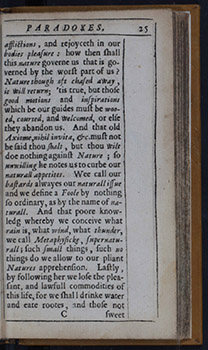 PARADOXES.
25
afflictions, and rejoyceth in our
PARADOXES.
25
afflictions, and rejoyceth in our
bodies pleasure: how then shall
this nature governe us that is go-
verned by the worst part of us?
Nature though oft chased away,
it will return; 'tis true, but those
good motions and inspirations
which be our guides must be woo-
ed, courted, and welcomed, or else
they abandon us. And that old
Axiome, nihil invita, &c. must not
be said thou shalt, but thou wilt
doe nothing against Nature; so
unwilling he notes us to curbe our
naturall appetites. Wee call our
bastards alwayes our naturall issue
and we define a Foole by nothing
so ordinary, as by the name of na-
turall. And that poore know-
ledg whereby we conceive what
rain is, what wind, what thunder,
we call Metaphysicke, supernatu-
rall; such small things, such no
things do we allow to our pliant
Natures apprehension. Lastly,
by following her we lose the plea-
sant, and lawfull commodities of
this life, for we shall drinke water
and eate rootes, and those not
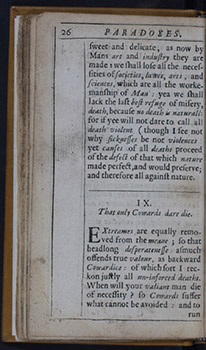 26
PARADOXES.
sweet and delicate, as now by
26
PARADOXES.
sweet and delicate, as now by
Mans art and industry they are
made: we shall lose all the neces-
sities of societies, lawes, arts, and
sciences, which are all the worke-
manship of Man: yea we shall
lack the last best refuge of misery,
death, because no death is naturall:
for if yee will not dare to call all
death violent (though I see not
why sicknesses be not violences)
yet causes of all deaths proceed
of the defect of that which nature
made perfect, and would preserve;
and therefore all against nature.
IX.
That only Cowards dare die.
EXxtreames are equally remo-
ved from the meane; so that
headlong desperatenesse asmuch
offends true valour, as backward
Cowardice: of which sort I rec-
kon justly all un-inforced deaths.
When will your valiant man die
of necessity? so Cowards suffer
what cannot be avoided: and to
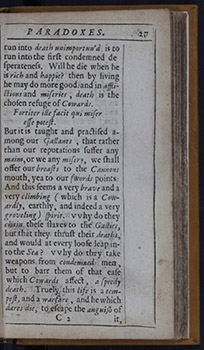 PARADOXES.
27
run into death unimportun'd is to
PARADOXES.
27
run into death unimportun'd is to
run into the first condemned de
sperateness. Will he die when he
is rich and happie? then by living
he may do more good: and in affli-
ctions and miseries, death is the
chosen refuge of Cowards.
Fortiter ille facit qui miser
esse potest.
But it is taught and practised a-
mong our Gallants, that rather
than our reputations suffer any
maim, or we any misery, we shall
offer our breasts to the Cannons
mouth, yea to our swords points:
And this seems a very brave and a
very climbing (which is a Cow-
ardly, earthly, and indeed a very
groveling) spirit. vvwhy do they
chain these slaves to the Gallies,
but that they thrust their deaths,
and would at every loose leap in-
to the Sea? vvwhy do they take
weapons from condemned men,
but to barr them of that ease
which Cowards affect, a speedy
death. Truely this life is a tem-
pest, and a warfare, and he which
dares die, to escape the anguish of
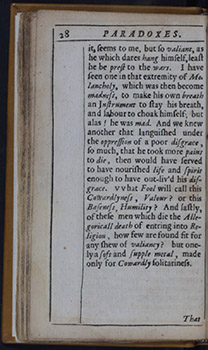 28
PARADOXES.
it, seems to me, but so valiant, as
28
PARADOXES.
it, seems to me, but so valiant, as
he which dares hang himself, least
he be prest to the wars. I have
seen one in that extremity of Me
lancholy, which was then become
madness, to make his own breath
an Instrument to stay his breath,
and labour to choak himself; but
alas! he was mad. And we knew
another that languished under
the oppression of a poor disgrace,
so much, that he took more pains
to die, then would have served
to have nourished life and spirit
enough to have out-liv'd his dis-
grace. vvwhat Fool will call this
Cowardlyness, Valour? or this
Baseness, Humility? And lastly,
of these men which die the Alle-
goricall death of entring into Re-
ligion, how few are found fit for
any shew of valiancy? but one-
ly a soft and supple metal, made
only for Cowardly solitariness.
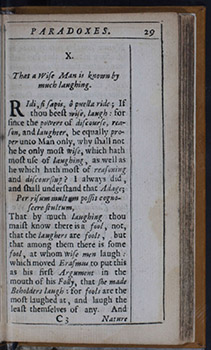 PARADOXES.
29
X.
PARADOXES.
29
X.
That a Wise Man is known by
much laughing.
RIidi, si sapis, ô puella ride; If
thou beest wise, laugh: for
since the powers of discourse, rea-
son, and laughter, be equally pro-
per unto Man only, why shall not
he be only most wise, which hath
most use of laughing, as well as
he which hath most of reasoning
and discoursing? I always did,
and shall understand that Adage;
Per risum multum possis cogno-
scere stultum,
That by much laughing thou
maist know there is a fool, not,
that the laughers are fools, but
that among them there is some
fool, at whom wise men laugh:
which moved Erasmus to put this
as his first Argument in the
mouth of his Folly, that she made
Beholders laugh: for fools are the
most laughed at, and laugh the
least themselves of any. And
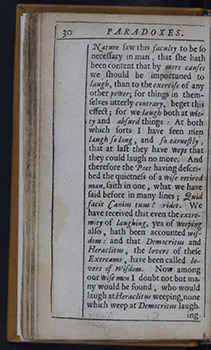 30
PARADOXES.
Nature saw this faculty to be so
30
PARADOXES.
Nature saw this faculty to be so
necessary in man, that she hath
been content that by more causes
we should be importuned to
laugh, than to the exercise of any
other power; for things in them-
selves utterly contrary, beget this
effect; for we laugh both at wit-
ty and absurd things: At both
which sorts I have seen men
laugh so long, and so earnestly,
that at last they have wept that
they could laugh no more. And
therefore the Poet having descri-
bed the quietness of a wise retired
man, saith in one, what we have
said before in many lines; Quid
facit Canius tuus? ridet. We
have received that even the extre-
mity of laughing, yea of weeping
also, hath been accounted wis-
dom: and that Democritus and
Heraclitus, the lovers of these
Extreams, have been called lo-
vers of Wisdom. Now among
our wise men I doubt not but ma-
ny would be found, who would
laugh at Heraclitus weeping, none
which weep at Democritus laugh-
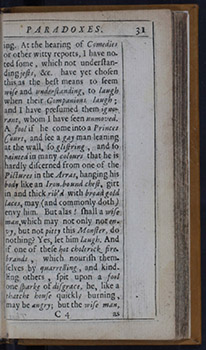 PARADOXES.
31
PARADOXES.
31
ing. At the hearing of Comedies
or other witty reports, I have no-
ted some, which not understan-
ding jests; &c. have yet chosen
this as the best means to seem
wise and understanding, to laugh
when their Companions laugh;
and I have presumed them igno-
rant, whom I have seen unmoved.
A fool if he come into a Princes
Court, and see a gay man leaning
at the wall, so glistring, and so
painted in many colours that he is
hardly discerned from one of the
Pictures in the Arras, hanging his
body like an Iron-bound chest, girt
in and thick rib'd with broad gold
laces, may (and commonly doth)
envy him. But alas! shall a wise
man, which may not only not en-
vy, but not pitty this Monster, do
nothing? Yes, let him laugh. And
if one of these hot cholerick fire-
brands, which nourish them-
selves by quarrelling, and kind-
ling others, spit upon a fool
one sparke of disgrace, he, like a
thatcht house quickly burning,
may be angry; but the wise man,
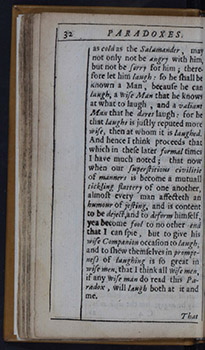 32
PARADOXES.
as cold as the Salamander, may
32
PARADOXES.
as cold as the Salamander, may
not only not be angry with him,
but not be sorry for him; there-
fore let him laugh: so he shall be
known a Man, because he can
laugh, a wise Man that he knows
at what to laugh, and a valiant
Man that he dares laugh: for he
that laughs is justly reputed more
wise, then at whom it is laughed.
And hence I think proceeds that
which in these later formal times
I have much noted; that now
when our superstitious civilitie
of manners is become a mutuall
tickling flattery of one another,
almost every man affecteth an
humour of jesting, and is content
to be deject, and to deform himself,
yea become fool to no other end
that I can spie, but to give his
wise Companion occasion to laugh;
and to shew themselves in prompt-
ness of laughing is so great in
wise men, that I think all wise men,
if any wise man do read this Pa-
radox, will laugh both at it and
me.
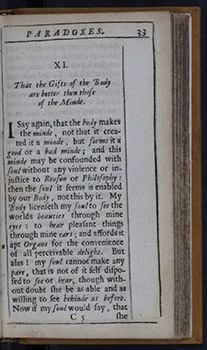 PARADOXES.
33
XI.
PARADOXES.
33
XI.
That the Gifts of the Body
are better then those
of the Minde.
I Ssay again, that the body makes
the minde, not that it crea-
ted it a minde, but forms it a
good or a bad minde; and this
minde may be confounded with
soul without any violence or in-
justice to Reason or Philosophy:
then the soul it seems is enabled
by our Body, not this by it. My
Body licenseth my soul to see the
worlds beauties through mine
eyes: to hear pleasant things
through mine ears; and affords it
apt Organs for the convenience
of all perceivable delight. But
alas! my soul cannot make any
part, that is not of it self dispo-
sed to see or hear, though with-
out doubt she be as able and as
willing to see behinde as before.
Now if my soul would say, that
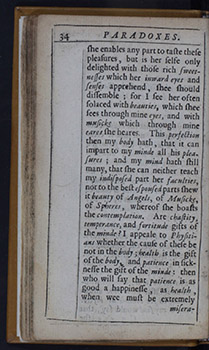 34
PARADOXES.
she enables any part to taste these
34
PARADOXES.
she enables any part to taste these
pleasures, but is her selfe only
delighted with those rich sweet-
nesses which her inward eyes and
senses apprehend, shee should
dissemble; for I see her often
solaced with beauties, which shee
sees through mine eyes, and with
musicke which through mine
eares she heares. This perfection
then my body hath, that it can
impart to my minde all his plea-
sures; and my mind hath still
many, that she can neither teach
my indisposed part her faculties,
nor to the best espoused parts shew
it beauty of Angels, of Musicke,
of Spheres, whereof she boasts
the contemplation. Are chastity,
temperance, and fortitude gifts of
the minde? I appeale to Physiti-
ans whether the cause of these be
not in the body; health is the gift
of the body, and patience in sick-
nesse the gift of the minde: then
who will say that patience is as
good a happinesse, as health,
when wee must be extremely
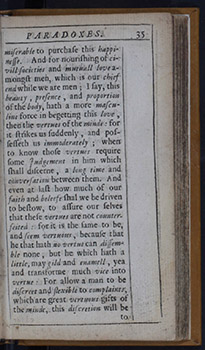 PARADOXES.
35
miserable to purchase this happi-
PARADOXES.
35
miserable to purchase this happi-nesse. And for nourishing of ci-
vill societies and mutuall love a-
mongst men, which is our chief
end while we are men; I say, this
beauty, presence, and proportion
of the body, hath a more mascu-
line force in begetting this love,
then the vertues of the minde: for
it strikes us suddenly, and pos-
sesseth us immoderately; when
to know those vertues require
some Judgement in him which
shall discerne, a long time and
conversation between them. And
even at last how much of our
faith and beleefe shal we be driven
to bestow, to assure our selves
that these vertues are not counter-
feited: for it is the same to be,
and seem vertuous, because that
he that hath no vertue can dissem-
ble none, but he which hath a
little, may gild and enamell, yea
and transforme much vice into
vertue: For allow a man to be
discreet and flexible to complaints,
which are great vertuous gifts of
the minde, this discretion will be
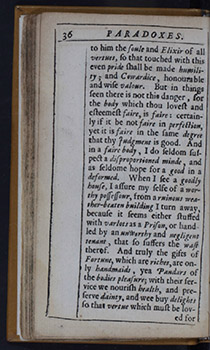 36
PARADOXES.
to him the soule and Elixir of all
36
PARADOXES.
to him the soule and Elixir of all
vertues, so that touched with this
even pride shall be made humili-
ty; and Cowardice, honourable
and wise valour. But in things
seen there is not this danger, for
the body which thou lovest and
esteemest faire, is faire: certain-
ly if it be not faire in perfection,
yet it is faire in the same degree
that thy Judgment is good. And
in a faire body, I do seldom sus-
pect a disproportioned minde, and
as seldome hope for a good in a
deformed. When I see a goodly
house, I assure my selfe of a wor-
thy possessour, from a ruinous wea-
ther-beaten building I turn away,
because it seems either stuffed
with varlots as a Prison, or hand-
led by an unworthy and negligent
tenant, that so suffers the wast
therof. And truly the gifts of
Fortune, which are riches, are on-
ly handmaids, yea Pandars of
the bodies pleasure; with their ser-
vice we nourish health, and pre-
serve dainty, and wee buy delights
so that vertue which must be lov-
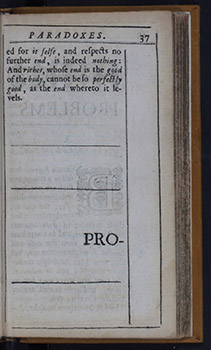 PARADOXES.
37
ed for it selfe, and respects no
PARADOXES.
37
ed for it selfe, and respects no
further end, is indeed nothing:
And riches, whose end is the good
of the body, cannot be so perfectly
good, as the end whereto it le-
vels.
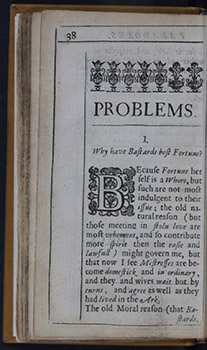 38
PROBLEMS.
38
PROBLEMS.I.
Why have Bastards best Fortune?
BEecause Fortune her
self is a Whore, but
such are not most
indulgent to their
issue; the old na-
tural reason (but
those meeting in stoln love are
most vehement, and so contribute
more spirit then the easie and
lawfull) might govern me, but
that now I see Mistresses are be-
come domestick and in ordinary,
and they and wives wait but by
turns, and agree as well as they
had lived in the Ark.
The old Moral reason (that Ba-
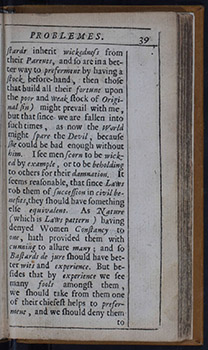 PROBLEMES.
39
PROBLEMES.
39
stards inherit wickedness from
their Parents, and so are in a bet-
ter way to preferment by having a
stock before-hand, then those
that build all their fortune upon
the poor and weak stock of Origi-
nal sin) might prevail with me,
but that since we are fallen into
such times, as now the World
might spare the Devil, because
she could be bad enough without
him. I see men scorn to be wick-
ed by example, or to be beholding
to others for their damnation. It
seems reasonable, that since Laws
rob them of succession in civil be-
nefits, they should have something
else equivalent. As Nature
(which is Laws pattern) having
denyed Women Constancy to
one, hath provided them with
cunning to allure many; and so
Bastards de jure should have bet-
ter wits and experience. But be-
sides that by experience we see
many fools amongst them,
we should take from them one
of their chiefest helps to prefer-
ment, and we should deny them
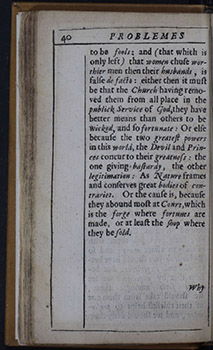 40
PROBLEMES.
40
PROBLEMES.
to be fools: and (that which is
only left) that women chuse wor-
thier men then their husbands, is
false de facto: either then it must
be that the Church having remo-
ved them from all place in the
publick Service of God, they have
better means than others to be
wicked, and so fortunate: Or else
because the two greatest powers
in this world, the Devil and Prin-
ces concur to their greatness: the
one giving bastardy, the other
legitimation: As Nature frames
and conserves great bodies of con-
traries. Or the cause is, because
they abound most at Court, which
is the forge where fortunes are
made, or at least the shop where
they be sold.
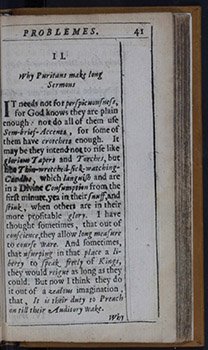 PROBLEMES.
41
II.
PROBLEMES.
41
II.
Why Puritans make long
Sermons
ITt needs not for perspicuousness,
for God knows they are plain
enough: nor do all of them use
Sem-brief-Accents, for some of
them have crotchets enough. It
may be they intend not to rise like
glorious Tapers and Torches, but
like Thin-wretched-sick-watching-
Candles, which languish and are
in a Divine Consumption from the
first minute, yea in their snuff, and
stink, when others are in their
more profitable glory. I have
thought sometimes, that out of
conscience, they allow long measure
to course ware. And sometimes,
that usurping in that place a li-
berty to speak freely of Kings,
they would reigne as long as they
could. But now I think they do
it out of a zealous imagination,
that, It is their duty to Preach
on till their Auditory wake.
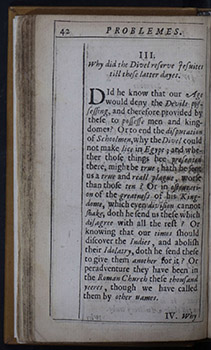 42
PROBLEMES.
III.
42
PROBLEMES.
III.
Why did the Divel reserve Jesuites
till these latter dayes.
DIid he know that our Age
would deny the Devils pos-
sessing, and therefore provided by
these to possesse men and king-
domes? Or to end the disputation
of Schoolmen, why the Divel could
not make lice in Egypt; and whe-
ther those things hee presented
there, might be true; hath he sent
us a true and reall plague, worse
than those ten? Or in ostentati-
on of the greatness of his King-
dome, which even division cannot
shake, doth he send us these which
disagree with all the rest? Or
knowing that our times should
discover the Indies, and abolish
their Idolatry, doth he send these
to give them another for it? Or
peradventure they have been in
the Roman Church these thousand
yeeres, though we have called
them by other names.
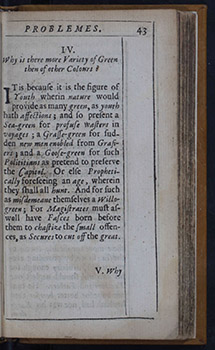 PROBLEMES.
43
IV.
PROBLEMES.
43
IV.
Why is there more Variety of Green
then of other Colours?
ITt is because it is the figure of
Youth wherin nature would
provide as many green, as youth
hath affections; and so present a
Sea-green for profuse wasters in
voyages; a Grasse-green for sud-
den new men enobled from Grasi-
ers; and a Goose-green for such
Polititians as pretend to preserve
the Capitol. Or else Propheti-
cally foreseeing an age, wherein
they shall all hunt. And for such
as misdemeane themselves a Willo-
green; For Magistrates must as-
well have Fasces born before
them to chastize the small offen-
ces, as Secures to cut off the great.
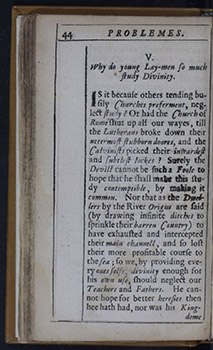 44
PROBLEMES.
V.
44
PROBLEMES.
V.
Why do young Lay-men so much
study Divinity.
ISs it because others tending bu-
sily Churches preferment, neg-
lect study? Or had the Church of
Rome shut up all our wayes, till
the Lutherans broke down their
uttermost stubborn doores, and the
Calvinists picked their inwardest
and subtlest lockes? Surely the
Devill cannot be such a Foole to
hope that he shall make this stu-
dy contemptible, by making it
common. Nor that as the Dwel-
lers by the River Origus are said
(by drawing infinite ditches to
sprinkle their barren Country) to
have exhausted and intercepted
their main channell, and so lost
their more profitable course to
the sea; so we, by providing eve-
ry ones selfe, divinity enough for
his own use, should neglect our
Teachers and Fathers. He can-
not hope for better heresies then
hee hath had, nor was his King-
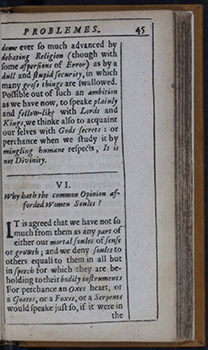 PROBLEMES.
45
PROBLEMES.
45
dome ever so much advanced by
debating Religion (though with
some aspersions of Error) as by a
dull and stupid security, in which
many gross things are swallowed.
Possible out of such an ambition
as we have now, to speake plainly
and fellow-like with Lords and
Kings, we thinke also to acquaint
our selves with Gods secrets: or
perchance when we study it by
mingling humane respects, It is
not Divinity.
VI.
Why hath the common Opinion af-
forded Women Soules?
ITt is agreed that we have not so
much from them as any part of
either our mortal soules of sense
or growth; and we deny soules to
others equall to them in all but
in speech for which they are be-
holding to their bodily instruments
For perchance an Oxes heart, or
a Goates, or a Foxes, or a Serpents
would speake just so, if it were in
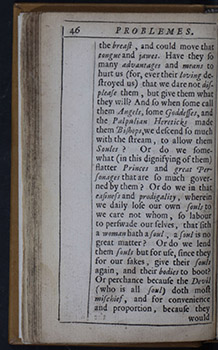 46
PROBLEMES.
46
PROBLEMES.
the breast, and could move that
tongue and jawes. Have they so
many advantages and means to
hurt us (for, ever their loving de-
stroyed us) that we dare not dis-
please them, but give them what
they will? And so when some call
them Angels, some Goddesses, and
the Palpulian Hereticks made
them Bishops, we descend so much
with the stream, to allow them
Soules? Or do we some-
what (in this dignifying of them)
flatter Princes and great Per-
sonages that are so much gover-
ned by them? Or do we in that
easiness and prodigality, wherein
we daily lose our own souls to
we care not whom, so labour
to perswade our selves, that sith
a woman hath a soul, a soul is no
great matter? Or do we lend
them souls but for use, since they
for our sakes, give their souls
again, and their bodies to boot?
Or perchance because the Devil
(who is all soul) doth most
mischief, and for convenience
and proportion, because they
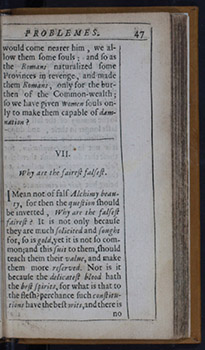 PROBLEMES.
47
PROBLEMES.
47
would come nearer him, we al-
low them some souls; and so as
the Romans naturalized some
Provinces in revenge, and made
them Romans, only for the bur-
then of the Common-wealth;
so we have given women souls on-
ly to make them capable of dam-
nation?
VII.
Why are the fairest falsest.
I Mmean not of fals Alchimy beau-
ty, for then the question should
be inverted, Why are the falsest
fairest? It is not only because
they are much solicited and sought
for, so is gold, yet it is not so com-
mon; and this suit to them, should
teach them their value, and make
them more reserved. Nor is it
because the delicatest blood hath
the best spirits, for what is that to
the flesh? perchance such constitu-
tions have the best wits, and there is
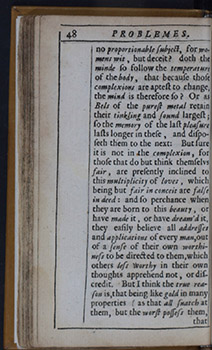 48
PROBLEMES.
48
PROBLEMES.
no proportionable subject, for wo-
mens wit, but deceit? doth the
minde so follow the temperature
of the body, that because those
complexions are aptest to change,
the mind is therefore so? Or as
Bels of the purest metal retain
their tinkling and sound largest;
so the memory of the last pleasure
lasts longer in these, and dispo-
seth them to the next: But sure
it is not in the complexion, for
those that do but think themselvs
fair, are presently inclined to
this multiplicity of loves, which
being but fair in conceit are false
in deed: and so perchance when
they are born to this beauty, or
have made it, or have dream'd it,
they easily believe all addresses
and applications of every man, out
of a sense of their own worthi-
ness to be directed to them, which
others less worthy in their own
thoughts apprehend not, or dis-
credit. But I think the true rea-
son is, that being like gold in many
properties (as that all snatch at
them, but the worst possess them,
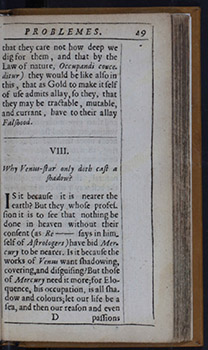 PROBLEMES.
49
PROBLEMES.
49
that they care not how deep we
dig for them, and that by the
Law of nature, Occupandi conce-
ditur) they would be like also in
this, that as Gold to make it self
of use admits allay, so they, that
they may be tractable, mutable,
and currant, have to their allay
Falshood.
VIII.
Why Venus-star only doth cast a
shadow?
ISs it because it is nearer the
earth? But they whose profes-
sion it is to see that nothing be
done in heaven without their
consent (as Re--- says in him-
self of Astrologers) have bid Mer-
cury to be nearer. Is it because
the works of Venus want shadowing,
covering, and disguising? But those
of Mercury need it more; for Elo-
quence, his occupation, is all sha-
dow and colours; let our life be a
sea, and then our reason and even
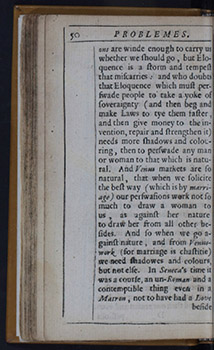 50
PROBLEMES.
50
PROBLEMES.
onspassions are winde enough to carry us
whether we should go, but Elo-
quence is a storm and tempest
that miscarries: and who doubts
that Eloquence which must per-
swade people to take a yoke of
soveraignty (and then beg and
make Laws to tye them faster,
and then give money to the in-
vention, repair and strengthen it)
needs more shadows and colou-
ring, then to perswade any man
or woman to that which is natu-
ral. And Venus markets are so
natural, that when we solicite
the best way (which is by marri-
age) our perswasions work not so
much to draw a woman to
us, as against her nature
to draw her from all other be-
sides. And so when we go a-
gainst nature, and from Venus-
work (for marriage is chastitie)
we need shadowes and colours,
but not else. In Seneca's time it
was a course, an un-Roman and a
contemptible thing even in a
Matron, not to have had a Love
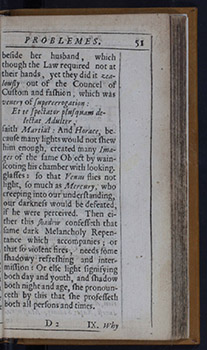 PROBLEMES.
51
PROBLEMES.
51
beside her husband, which
though the Law required not at
their hands, yet they did it zea-
lously out of the Councel of
Custom and fashion, which was
venery of supererrogation:
Et te spectator plusquam de-
lectat Adulter,
saith Martial: And Horace, be-
cause many lights would not shew
him enough, created many Ima-
ges of the same Object by wain-
scoting his chamber with looking-
glasses: so that Venus flies not
light, so much as Mercury, who
creeping into our understanding,
our darkness would be defeated,
if he were perceived. Then ei-
ther this shadow confesseth that
same dark Melancholy Repen-
tance which accompanies; or
that so violent fires, needs some
shadowy refreshing and inter-
mission: Or else light signifying
both day and youth, and shadow
both night and age, she pronoun-
ceth by this that she professeth
both all persons and times.
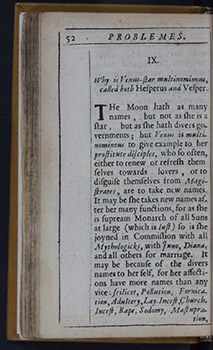 52
PROBLEMES.
IX.
52
PROBLEMES.
IX.
Why is Venus-star multinominous,
called both Hesperus and Vesper.
THhe Moon hath as many
names, but not as she is a
star, but as she hath divers go-
vernments; but Venus is multi-
nominous to give example to her
prostitute disciples, who so often,
either to renew or refresh them
selves towards lovers, or to
disguise themselves from Magi-
strates, are to take new names.
It may be she takes new names af-
ter her many functions, for as she
is supream Monarch of all Suns
at large (which is lust) so is she
joyned in Commission with all
Mythologicks, with Juno, Diana,
and all others for marriage. It
may be because of the divers
names to her self, for her affecti-
ons have more names than any
vice: scilicet, Pollution, Fornica-
tion, Adultery, Lay-Incest, Church-
Incest, Rape, Sodomy, Mastupra-
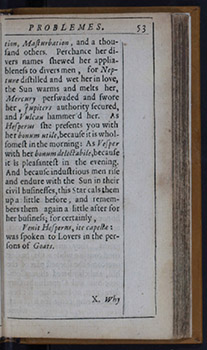 PROBLEMES.
53
tion, Masturbation, and a thou-
PROBLEMES.
53
tion, Masturbation, and a thou-sand others. Perchance her di-
vers names shewed her applia-
bleness to divers men, for Nep-
tune distilled and wet her in love,
the Sun warms and melts her,
Mercury perswaded and swore
her, Jupiters authority secured,
and Vulcan hammer'd her. As
Hesperus she presents you with
her bonum utile, because it is whol-
somest in the morning: As Vesper
with her bonum delectabile, because
it is pleasantest in the evening.
And because industrious men rise
and endure with the Sun in their
civil businesses, this Star cals them
up a little before, and remem-
bers them again a little after for
her business; for certainly,
Venit Hesperus, ite capellæ:
was spoken to Lovers in the per-
sons of Goats.
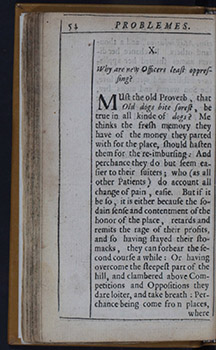 54
PROBLEMES.
X.
54
PROBLEMES.
X.
Why are new Officers least oppres-
sing?
MUust the old Proverb, that
Old dogs bite sorest, be
true in all kinde of dogs? Me
thinks the fresh memory they
have of the money they parted
with for the place, should hasten
them for the re-imbursing: And
perchance they do but seem ea-
sier to their suiters; who (as all
other Patients) do account all
change of pain, easie. But if it
be so, it is either because the so-
dain sense and contentment of the
honor of the place, retards and
remits the rage of their profits,
and so having stayed their sto-
macks, they can forbear the se-
cond course a while: Or having
overcome the steepest part of the
hill, and clambered above Com-
petitions and Oppositions they
dare loiter, and take breath: Per-
chance being come from places,
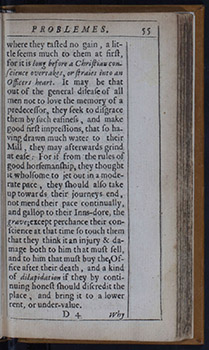 PROBLEMES.
55
PROBLEMES.
55
where they tasted no gain, a lit-
tle seems much to them at first,
for it is long before a Christian con-
science overtakes, or straies into an
Officers heart. It may be that
out of the general disease of all
men not to love the memory of a
predecessor, they seek to disgrace
them by such easiness, and make
good first impressions, that so ha-
ving drawn much water to their
Mill, they may afterwards grind
at ease: For if from the rules of
good horsemanship, they thought
it wholsome to jet out in a mode-
rate pace, they should also take
up towards their journeys end,
not mend their pace continually,
and gallop to their Inns-dore, the
grave; except perchance their con-
science at that time so touch them
that they think it an injury & da-
mage both to him that must sell,
and to him that must buy the Of-
fice after their death, and a kind
of dilapidation if they by conti-
nuing honest should discredit the
place, and bring it to a lower
rent, or under-value.
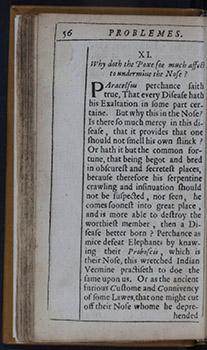 56
PROBLEMES.
XI.
56
PROBLEMES.
XI.
Why doth the Poxe soe much affect
to undermine the Nose?
PAaracelsus perchance saith
true, That every Disease hath
his Exaltation in some part cer-
taine. But why this in the Nose?
Is there so much mercy in this di-
sease, that it provides that one
should not smell his own stinck?
Or hath it but the common for-
tune, that being begot and bred
in obscurest and secretest places,
because therefore his serpentine
crawling and insinuation should
not be suspected, nor seen, he
comes soonest into great place,
and is more able to destroy the
worthiest member, then a Di-
sease better born? Perchance as
mice defeat Elephants by knaw-
ing their Proboscis, which is
their Nose, this wretched Indian
Vermine practiseth to doe the
same upon us. Or as the ancient
furious Custome and Connivency
of some Lawes, that one might cut
off their Nose whome he depre-
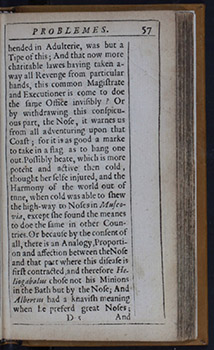 PROBLEMES.
57
hended in Adulterie, was but a
PROBLEMES.
57
hended in Adulterie, was but a
Tipe of this; And that now more
charitable lawes having taken a-
way all Revenge from particular
hands, this common Magistrate
and Executioner is come to doe
the same Office invisibly? Or
by withdrawing this conspicu-
ous part, the Nose, it warnes us
from all adventuring upon that
Coast; for it is as good a marke
to take in a flag as to hang one
out. Possibly heate, which is more
potent and active then cold,
thought her selfe injured, and the
Harmony of the world out of
tune, when cold was able to shew
the high-way to Noses in Musco
via, except she found the meanes
to doe the same in other Coun-
tries. Or because by the consent of
all, there is an Analogy, Proporti-
on and affection between the Nose
and that part where this disease is
first contracted, and therefore He-
liogabalus chose not his Minions
in the Bath but by the Nose; And
Albertus had a knavish meaning
when he preferd great Noses;
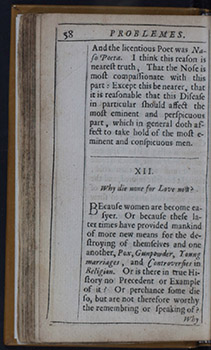 58
PROBLEMES.
58
PROBLEMES.
And the licentious Poet was Na-
so Poeta. I think this reason is
nearest truth, That the Nose is
most compassionate with this
part: Except this be nearer, that
it is reasonable that this Disease
in particular should affect the
most eminent and perspicuous
part, which in general doth af-
fect to take hold of the most e-
minent and conspicuous men.
XII.
Why die none for Love now?
BEecause women are become ea-
syer. Or because these la-
ter times have provided mankind
of more new means for the de-
stroying of themselves and one
another, Pox, Gunpowder, Young
marriages, and Controversies in
Religion. Or is there in true Hi-
story no Precedent or Example
of it? Or perchance some die
so, but are not therefore worthy
the remembring or speaking of?
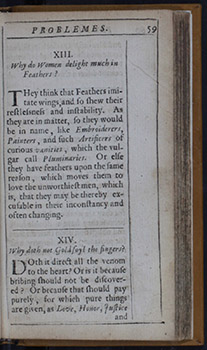 PROBLEMES.
59
XIII.
PROBLEMES.
59
XIII.
Why do Women delight much in
Feathers?
THhey think that Feathers imi-
tate wings, and so shew their
restlessness and instability. As
they are in matter, so they would
be in name, like Embroiderers,
Painters, and such Artificers of
curious vanities, which the vul-
gar call Pluminaries. Or else
they have feathers upon the same
reason, which moves them to
love the unworthiest men, which
is, that they may be thereby ex-
cusable in their inconstancy and
often changing.
XIV.
Why doth not Gold soyl the fingers?
DOoth it direct all the venom
to the heart? Or is it because
bribing should not be discover-
ed? Or because that should pay
purely, for which pure things
are given, as Love, Honor, Justice
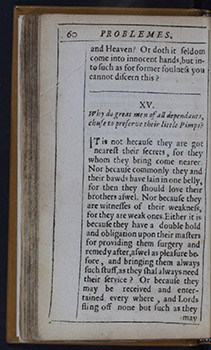 60
PROBLEMES.
60
PROBLEMES.
and Heaven? Or doth it seldom
come into innocent hands, but in-
to such as for former foulness you
cannot discern this?
XV.
Why do great men of all dependants,
chuse to preserve their little Pimps?
ITt is not hecause they are got
nearest their secrets, for they
whom they bring come nearer.
Nor because commonly they and
their bawds have lain in one belly,
for then they should love their
brothers aswel. Nor because they
are witnesses of their weakness,
for they are weak ones. Either it is
because they have a double hold
and obligation upon their masters
for providing them surgery and
remedy after, aswel as pleasure be-
fore, and bringing them always
such stuff, as they shal always need
their service? Or because they
may be received and enter-
tained every where, and Lords
fling off none but such as they
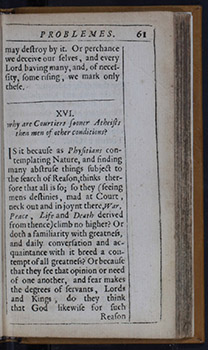 PROBLEMES.
61
PROBLEMES.
61
may destroy by it. Or perchance
we deceive our selves, and every
Lord having many, and, of neces-
sity, some rising, we mark
only these.
XVI.
why are Courtiers sooner Atheists
then men of other conditions?
ISs it because as Physitians con-
templating Nature, and finding
many abstruse things subject to
the search of Reason, thinks ther-
fore that all is so; so they (seeing
mens destinies, mad at Court,
neck out and in joynt there, War,
Peace, Life and Death derived
from thence) climb no higher? Or
doth a familiarity with greatness,
and daily conversation and ac-
quaintance with it breed a con-
tempt of all greatness? Or because
that they see that opinion or need
of one another, and fear makes
the degrees of servants, Lords
and Kings, do they think
that God likewise for such
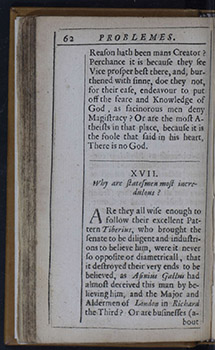 62
PROBLEMES.
62
PROBLEMES.
Reason hath been mans Creator?
Perchance it is because they see
Vice prosper best there, and, bur-
thened with sinne, doe they not,
for their ease, endeavour to put
off the feare and Knowledge of
God, as facinorous men deny
Magistracy? Or are the most A-
theists in that place, because it is
the foole that said in his heart,
There is no God.
XVII.
Why are statesmen most incre-
dulous?
ARre they all wise enough to
follow their excellent Pat-
tern Tiberius, who brought the
senate to be diligent and industri-
onus to believe him, were it never
so opposite or diametricall, that
it destroyed their very ends to be
believed, as Asinius Gallus had
almost deceived this man by be-
lieving him, and the Major and
Aldermen of London in Richard
the Third? Or are businesses (a-
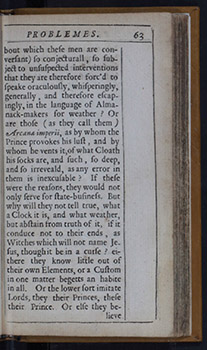 PROBLEMES.
63
bout which these men are con-
PROBLEMES.
63
bout which these men are con-versant) so conjecturall, so sub-
ject to unsuspected interventions
that they are therefore forc'd to
speake oraculously, whisperingly,
generally, and therefore escap-
ingly, in the language of Alma-
nack-makers for weather? Or
are those (as they call them)
Arcana imperii, as by whom the
Prince provokes his lust, and by
whom he vents it, of what Cloath
his socks are, and such, so deep,
and so irreveald, as any error in
them is inexcusable? If these
were the reasons, they would not
only serve for state-business. But
why will they not tell true, what
a Clock it is, and what weather,
but abstain from truth of it, if it
conduce not to their ends, as
Witches which will not name Je-
sus, though it be in a curse? ei-
there they know little out of
their own Elements, or a Custom
in one matter begetts an habite
in all. Or the lower sort imitate
Lords, they their Princes, these
their Prince. Or else they be
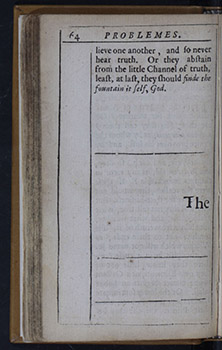 64
PROBLEMES.
64
PROBLEMES.
lieve one another, and so never
hear truth. Or they abstain
from the little Channel of truth,
least, at last, they should finde the
fountain it self, God.
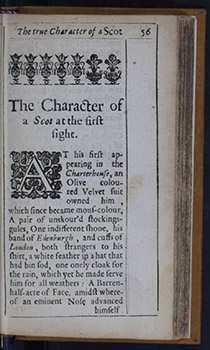 The true Character of a Scot
56
The Character of
The true Character of a Scot
56
The Character of
a Scot at the first
sight.
ATt his first ap-
pearing in the
Charterhouse, an
Olive colou-
red Velvet suit
owned him,
which since became mous-colour,
A pair of unskour'd stockings-
gules, One indifferent shooe, his
band of Edenburgh, and cuffs of
London, both strangers to his
shirt, a white feather in a hat that
had bin sod, one onely cloak for
the rain, which yet he made serve
him for all weathers: A Barren-
half-acre of Face, amidst where-
of an eminent Nose advanced
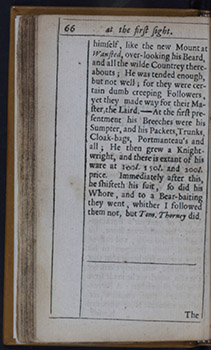 66
at the first sight.
66
at the first sight.
himself, like the new Mount at
Wansted, over-looking his Beard,
and all the wilde Countrey there-
abouts; He was tended enough,
but not well; for they were cer-
tain dumb creeping Followers,
yet they made way for their Ma-
ster, the Laird.---At the first pre-
sentment his Breeches were his
Sumpter, and his Packets, Trunks,
Cloak-bags, Portmanteau's and
all; He then grew a Knight-
wright, and there is extant of his
ware at 100l. 150l. and 200l.
price. Immediately after this,
he shifteth his suit, so did his
Whore, and to a Bear-baiting
they went, whither I followed
them not, but Tom. Thorney did.
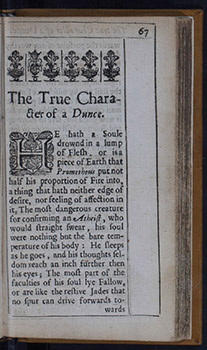 67
The True Chara-
67
The True Chara-cter of a Dunce.
HEe hath a Soule
drownd in a lump
of Flesh, or is a
piece of Earth that
Prometheus put not
half his proportion of Fire into,
a thing that hath neither edge of
desire, nor feeling of affection in
it, The most dangerous creature
for confirming an Atheist, who
would straight swear, his soul
were nothing but the bare tem-
perature of his body: He sleeps
as he goes, and his thoughts sel-
dom reach an inch further then
his eyes; The most part of the
faculties of his soul lye Fallow,
or are like the restive Jades that
no spur can drive forwards to-
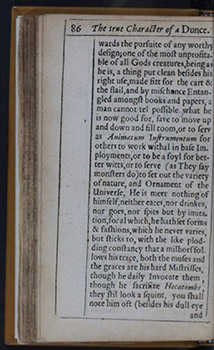 8666
The true Character of a Dunce.
wards the pursuite of any worthy
8666
The true Character of a Dunce.
wards the pursuite of any worthy
design; one of the most unprofita-
ble of all Gods creatures, being as
he is, a thing put clean besides his
right use, made fitt for the cart &
the flail, and by mischance Entan-
gled amongst books and papers, a
man cannot tel possible what he
is now good for, save to move up
and down and fill room, or to serv
as Animatum Instrumentum for
others to work withal in base Im-
ployments, or to be a foyl for bet-
ter witts, or to serve (as They say
monsters do) to set out the variety
of nature, and Ornament of the
Universe, He is meer nothing of
himself, neither eates, nor drinkes,
nor goes, nor spits but by imita-
tion, for al which, he hath set forms
& fashions, which he never varies,
but sticks to, with the like plod-
ding constancy that a milhors fol-
lows his trace, both the muses and
the graces are his hard Mistrisses,
though he daily Invocate them,
though he sacrifize Hecatombs,
they stil look a squint, you shall
note him oft (besides his dull eye
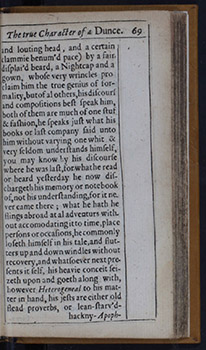 The true Character of a Dunce.
69
The true Character of a Dunce.
69
and louting head, and a certain
clammie benum'd pace) by a fair
displai'd beard, a Nightcap and a
gown, whose very wrincles pro-
claim him the true genius of for-
mality, but of al others, his discours
and compositions best speak him,
both of them are much of one stuf
& fashion, he speaks just what his
books or last company said unto
him without varying one whit &
very seldom understands himself,
you may know by his discourse
where he was last, for what he read
or heard yesterday he now dis-
chargeth his memory or notebook
of, not his understanding, for it ne-
ver came there; what he hath he
flings abroad at al adventurs with-
out accomodating it to time, place
persons or occasions, he commonly
loseth himself in his tale, and flut-
ters up and down windles without
recovery, and whatsoever next pre-
sents it self, his heavie conceit sei-
zeth upon and goeth along with,
however Heterogeneal to his mat-
ter in hand, his jests are either old
flead proverbs, or lean-starv'd-
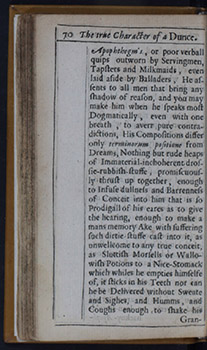 70
The true Character of a Dunce.
70
The true Character of a Dunce.
hackny-Apophthegm's, or poor verball
quips outworn by Servingmen,
Tapsters and Milkmaids, even
laid aside by Balladers, He as-
sents to all men that bring any
shadow of reason, and you may
make him when he speaks most
Dogmatically, even with one
breath, to averr pure contra-
dictions, His Compositions differ
only terminorum positione from
Dreams, Nothing but rude heaps
of Immaterial-inchoherent dros-
sie-rubbish-stuffe, promiscuous-
ly thrust up together, enough
to Infuse dullness and Barrenness
of Conceit into him that is so
Prodigall of his eares as to give
the hearing, enough to make a
mans memory Ake with suffering
such dirtie stuffe cast into it, as
unwellcome to any true conceit,
as Sluttish Morsells or Wallo-
wish Potions to a Nice-Stomack
which whiles he empties himselfe
of, it sticks in his Teeth nor can
he be Delivered without Sweate
and Sighes, and Humms, and
Coughs enough to shake his
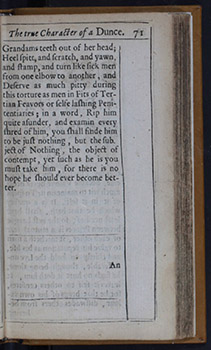 The true Character of a Dunce.
71
The true Character of a Dunce.
71
Grandams teeth out of her head;
Heel spitt, and scratch, and yawn,
and stamp, and turn like sick men
from one elbow to another, and
Deserve as much pitty during
this torture as men in Fits of Ter-
tian Feavors or selfe lashing Peni-
tentiaries; in a word, Rip him
quite asunder, and examin every
shred of him, you shall finde him
to be just nothing, but the sub-
ject of Nothing, the object of
contempt, yet such as he is you
must take him, for there is no
hope he should ever become bet-
ter.
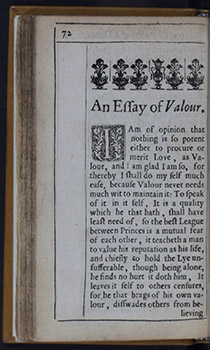 72
An Essay of Valour.
72
An Essay of Valour.
I Aam of opinion that
nothing is so potent
either to procure or
merit Love, as Va-
lour, and I am glad I am so, for
thereby I shall do my self much
ease, because Valour never needs
much wit to maintain it: To speak
of it in it self, It is a quality
which he that hath, shall have
least need of, so the best League
between Princes is a mutual fear
of each other, it teacheth a man
to value his reputation as his life,
and chiefly to hold the Lye un-
sufferable, though being alone,
he finds no hurt it doth him, It
leaves it self to others censures,
for he that brags of his own va-
lour, disswades others from be-
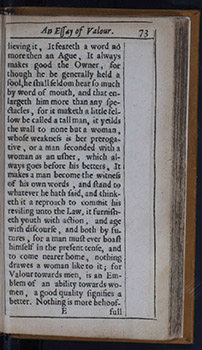 An Essay of Valour.
73
An Essay of Valour.
73
lieving it, It feareth a word no
more then an Ague, It always
makes good the Owner, for
though he be generally held a
fool, he shall seldom hear so much
by word of mouth, and that en-
largeth him more than any spe-
ctacles, for it maketh a little fel-
low be called a tall man, it yeilds
the wall to none but a woman,
whose weakness is her preroga-
tive, or a man seconded with a
woman as an usher, which al-
ways goes before his betters, It
makes a man become the witness
of his own words, and stand to
whatever he hath said, and think-
eth it a reproach to commit his
reviling unto the Law, it furnish-
eth youth with action, and age
with discourse, and both by fu-
tures, for a man must ever boast
himself in the present tense, and
to come nearer home, nothing
drawes a woman like to it; for
Valour towards men, is an Em-
blem of an ability towards wo-
men, a good quality signifies a
better. Nothing is more behoof-
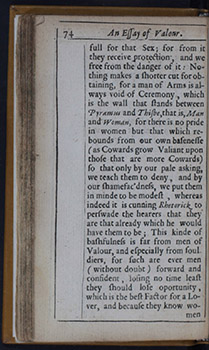 74
An Essay of Valour.
74
An Essay of Valour.
full for that Sex; for from it
they receive protection, and we
free from the danger of it: No-
thing makes a shorter cut for ob
taining, for a man of Arms is al-
ways void of Ceremony, which
is the wall that stands between
Pyramus and Thisbe, that is, Man
and Woman, for there is no pride
in women but that which re-
bounds from our own basenesse
(as Cowards grow Valiant upon
those that are more Cowards)
so that only by our pale asking,
we teach them to deny, and by
our shamefac'dness, we put them
in minde to be modest, whereas
indeed it is cunning Rhetorick to
perswade the hearers that they
are that already which he would
have them to be; This kinde of
bashfulness is far from men of
Valour, and especially from soul-
diers, for such are ever men
(without doubt) forward and
confident, losing no time least
they should lose oportunity,
which is the best Factor for a Lo-
ver, and because they know wo-
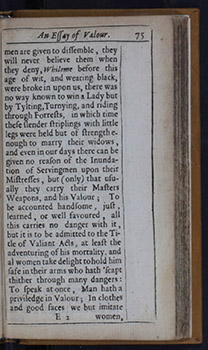 An Essay of Valour.
75
An Essay of Valour.
75
men are given to dissemble, they
will never believe them when
they deny, Whilome before this
age of wit, and wearing black,
were broke in upon us, there was
no way known to win a Lady but
by Tylting, Turnying, and riding
through Forrests, in which time
these slender striplings with little
legs were held but of strength e-
nough to marry their widows,
and even in our days there can be
given no reason of the Inunda-
tion of Servingmen upon their
Mistresses, but (only) that usu-
ally they carry their Masters
Weapons, and his Valour; To
be accounted handsome, just,
learned, or well favoured, all
this carries no danger with it,
but it is to be admitted to the Ti-
tle of Valiant Acts, at least the
adventuring of his mortality, and
al women take delight to hold him
safe in their arms who hath 'scapt
thither through many dangers:
To speak at once, Man hath a
priviledge in Valour; In clothes
and good faces we but imitate
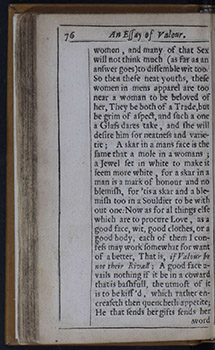 76
An Essay of Valour.
76
An Essay of Valour.
women, and many of that Sex
will not think much (as far as an
answer goes) to dissemble wit too.
So then these neat youths, these
women in mens apparel are too
near a woman to be beloved of
her, They be both of a Trade, but
be grim of aspect, and such a one
a Glass dares take, and she will
desire him for neatness and varie-
tie; A skar in a mans face is the
same that a mole in a womans;
a Jewel set in white to make it
seem more white, for a skar in a
man is a mark of honour and no
blemish, for 'tis a skar and a ble-
mish too in a Souldier to be with
out one: Now as for al things else
which are to procure Love, as a
good face, wit, good clothes, or a
good body, each of them I con-
fess may work somewhat for want
of a better, That is, if Valour be
not their Rivall; A good face a-
vails nothing if it be in a coward
that is bashfull, the utmost of it
is to be kiss'd, which rather en-
creaseth then quencheth appetite;
He that sends her gifts sends her
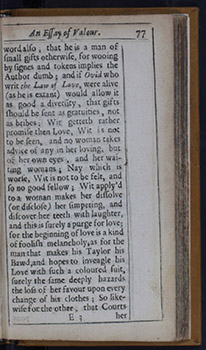 An Essay of Valour.
77
An Essay of Valour.
77
world also, that he is a man of
small gifts otherwise, for wooing
by signes and tokens implies the
Author dumb; and if Ovid who
writ the Law of Love, were alive
(as he is extant) would allow it
as good a diversity, that gifts
should be sent as gratuities, not
as bribes; Wit getteth rather
promise then Love, Wit is not
to be seen, and no woman takes
advice of any in her loving, but
of her own eyes, and her wai-
ting womans; Nay which is
worse, Wit is not to be felt, and
so no good fellow; Wit apply'd
to a woman makes her dissolve
(or disclose) her simpering, and
discover her teeth with laughter,
and this is surely a purge for love;
for the beginning of love is a kind
of foolish melancholy, as for the
man that makes his Taylor his
Bawd, and hopes to inveagle his
Love with such a coloured suit,
surely the same deeply hazards
the loss of her favour upon every
change of his clothes; So like-
wise for the other, that Courts
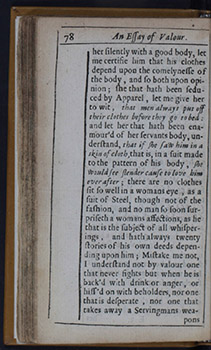 78
An Essay of Valour.
78
An Essay of Valour.
her silently with a good body, let
me certifie him that his clothes
depend upon the comelynesse of
the body, and so both upon opi-
nion; she that hath been sedu-
ced by Apparel, let me give her
to wit, that men always put off
their clothes before they go to bed:
and let her that hath been ena-
mour'd of her servants body, un-
derstand, that if she saw him in a
skin of cloth, that is, in a suit made
to the pattern of his body, she
would see slender cause to love him
ever after; there are no clothes
sit so well in a womans eye, as a
suit of Steel, though not of the
fashion, and no man so soon sur-
priseth a womans affections, as he
that is the subject of all whisper-
ings, and hath always twenty
stories of his own deeds depen-
ding upon him; Mistake me not,
I understand not by valour one
that never fights but when he is
back'd with drink or anger, or
hiss'd on with beholders, nor one
that is desperate, nor one that
takes away a Servingmans wea-
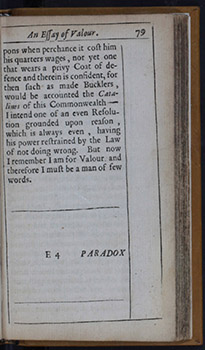 An Essay of Valour.
79
pons when perchance it cost him
An Essay of Valour.
79
pons when perchance it cost him
his quarters wages, nor yet one
that wears a privy Coat of de-
fence and therein is confident, for
then such as made Bucklers,
would be accounted the Cata-
lines of this Commonwealth——
I intend one of an even Resolu-
tion grounded upon reason,
which is always even, having
his power restrained by the Law
of not doing wrong. But now
I remember I am for Valour and
therefore I must be a man of few
words.
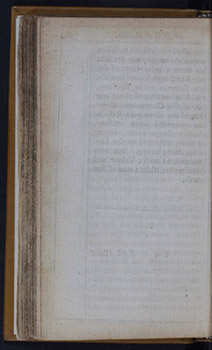 80
80
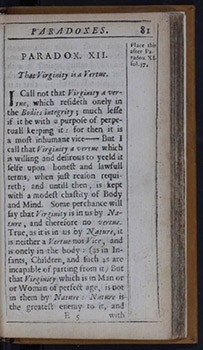 PARADOXES.
81
PARADOX. XII.
PARADOXES.
81
PARADOX. XII.
That Virginity is a Vertue. Place this
after Pa-
radox XI.
fol. 37.
I Ccall not that Virginity a ver-
tue, which resideth onely in
the Bodies integrity; much lesse
if it be with a purpose of perpe-
tuall keeping it: for then it is
a most inhumane vice——But I
call that Virginity a vertue which
is willing and desirous to yeeld it
selfe upon honest and lawfull
terms, when just reason requi-
reth; and untill then, is kept
with a modest chastity of Body
and Mind. Some perchance will
say that Virginity is in us by Na-
ture, and therefore no vertue.
True, as it is in us by Nature, it
is neither a Vertue nor Vice, and
is onely in the body: (as in In-
fants, Children, and such as are
incapable of parting from it) But
that Virginity which is in Man or
or Woman of perfect age, is not
in them by Nature: Nature is
the greatest enemy to it, and
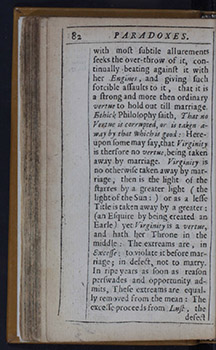 82
PARADOXES.
82
PARADOXES.
with most subtile allurements
seeks the over-throw of it, con-
tinually beating against it with
her Engines, and giving such
forcible assaults to it, that it is
a strong and more then ordinary
vertue to hold out till marriage.
Ethick Philosophy saith, That no
Vertue is corrupted, or is taken a-
way by that which is good: Here-
upon some may say, that Virginity
is therfore no vertue, being taken
away by marriage. Virginity is
no otherwise taken away by mar-
riage, then is the light of the
starres by a greater light (the
light of the Sun:) or as a lesse
Title is taken away by a greater:
(an Esquire by being created an
Earle) yet Virginity is a vertue,
and hath her Throne in the
middle: The extreams are, in
Excesse: to violate it before mar-
riage; in defect, not to marry.
In ripe years as soon as reason
perswades and opportunity ad-
mits, These extreams are equal-
ly removed from the mean: The
excesse proceeds from Lust, the
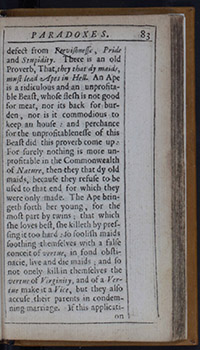 PARADOXES.
83
PARADOXES.
83
defect from Peevishnesse, Pride
and Stupidity. There is an old
Proverb, That, they that dy maids,
must lead Apes in Hell. An Ape
is a ridiculous and an unprofita-
ble Beast, whose flesh is not good
for meat, nor its back for bur-
den, nor is it commodious to
keep an house: and perchance
for the unprofitablenesse of this
Beast did this proverb come up:
For surely nothing is more un-
profitable in the Commonwealth
of Nature, then they that dy old
maids, because they refuse to be
used to that end for which they
were only made. The Ape brin-
geth forth her young, for the
most part by twins; that which
she loves best, she killeth by pres-
sing it too hard: so foolish maids
soothing themselves with a false
conceit of vertue, in fond obsti-
nacie, live and die maids; and so
not onely kill in themselves the
vertue of Virginity, and of a Ver-
tue make it a Vice, but they also
accuse their parents in condem-
ning marriage. If this applicati-
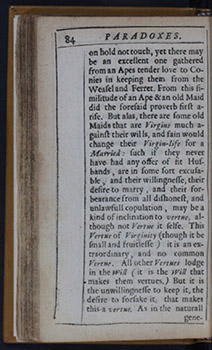 84
PARADOXES.
84
PARADOXES.
on hold not touch, yet there may
be an excellent one gathered
from an Apes tender love to Co-
nies in keeping them from the
Weasel and Ferret. From this si-
militude of an Ape & an old Maid
did the foresaid proverb first a-
rise. But alas, there are some old
Maids that are Virgins much a-
gainst their wills, and fain would
change their Virgin-life for a
Married: such if they never
have had any offer of fit Hus-
bands, are in some sort excusa-
ble, and their willingnesse, their
desire to marry, and their for-
bearance from all dishonest, and
unlawfull copulation, may be a
kind of inclination to vertue, al-
though not Vertue it selfe. This
Vertue of Virginity (though it be
small and fruitlesse) it is an ex-
traordinary, and no common
Vertue. All other Vertues lodge
in the Will (it is the Will that
makes them vertues.) But it is
the unwillingnesse to keep it, the
desire to forsake it, that makes
this a vertue. As in the naturall
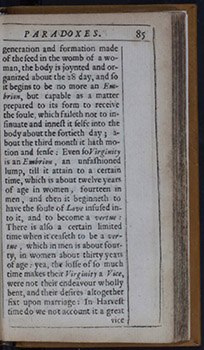 PARADOXES.
85
PARADOXES.
85
generation and formation made
of the seed in the womb of a wo-
man, the body is joynted and or-
ganized about the 28 day, and so
it begins to be no more an Em-
brion, but capable as a matter
prepared to its form to receive
the soule, which faileth not to in-
sinuate and innest it selfe into the
body about the fortieth day; a-
bout the third month it hath mo-
tion and sense: Even so Virginity
is an Embrion, an unfashioned
lump, till it attain to a certain
time, which is about twelve years
of age in women, fourteen in
men, and then it beginneth to
have the soule of Love infused in-
to it, and to become a vertue:
There is also a certain limited
time when it ceaseth to be a ver-
tue, which in men is about four-
ty, in women about thirty years
of age: yea, the losse of so much
time makes their Virginity a Vice,
were not their endeavour wholly
bent, and their desires altogether
fixt upon marriage: In Harvest
time do we not account it a great
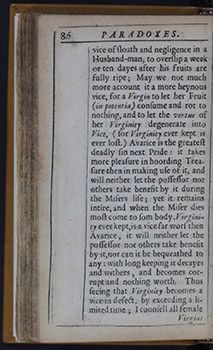 86
PARADOXES.
86
PARADOXES.
vice of sloath and negligence in a
Husband-man, to overslip a week
or ten dayes after his fruits are
fully ripe; May we not much
more account it a more heynous
vice, for a Virgin to let her Fruit
(in potentia) consume and rot to
nothing, and to let the vertue of
her Virginity degenerate into
Vice, (for Virginity ever kept is
ever lost.) Avarice is the greatest
deadly sin next Pride: it takes
more pleasure in hoording Trea-
sure then in making use of it, and
will neither let the possessor nor
others take benefit by it during
the Misers life; yet it remains
intire, and when the Miser dies
most come to som body. Virgini-
ty ever kept, is a vice far wors then
Avarice, it will neither let the
possessor nor others take benefit
by it, nor can it be bequeathed to
any: with long keeping it decayes
and withers, and becomes cor-
rupt and nothing worth. Thus
seeing that Virginity becomes a
vice in defect, by exceeding a li-
mited time; I counsell all female
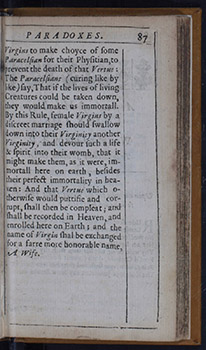 PARADOXES.
87
PARADOXES.
87
Virgins to make choyce of some
Paracelsian for their Physitian, to
prevent the death of that Vertue:
The Paracelsians (curing like by
like) say, That if the lives of living
Creatures could be taken down,
they would make us immortall.
By this Rule, female Virgins by a
discreet marriage should swallow
down into their Virginity another
Virginity, and devour such a life
& spirit into their womb, that it
might make them, as it were, im-
mortall here on earth, besides
their perfect immortality in hea-
ven: And that Vertue which o-
therwise would putrifie and cor-
rupt, shall then be compleat; and
shall be recorded in Heaven, and
enrolled here on Earth; and the
name of Virgin shal be exchanged
for a farre more honorable name,
A Wife.
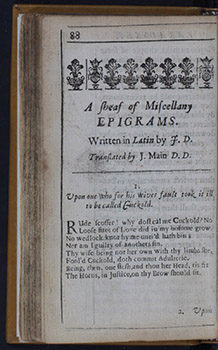 88
A sheaf of Miscellany
88
A sheaf of Miscellany EPIGRAMS.
Written in Latin by I. D.
Translated by J. Main D. D. 1.
Upon one who for his wives fault took it ill
to be called Cuckold. RUdeRude scoffer! why dost cal me Cuckold? No Loose fires of Love did in my bosome grow. No wedlock knot by me unti'd hath bin; Nor am I guilty of anothers sin. Thy wife being not her own with thy limbs she, Fool'd Cuckold, doth commit Adulterie. Being, then, one flesh, and thou her Head, tis fit The Horus, in Justice, on thy Brow should fit.
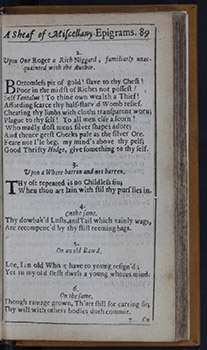 A Sheaf of Miscellany Epigrams.
89
2.
A Sheaf of Miscellany Epigrams.
89
2. Upon One Roger a Rich Niggard, familiarly unac-
quainted with the Author. BOttomlessBottomless pit of gold! slave to thy Chest! Poor in the midst of Riches not possest! Self Tantalus! To thine own wealth a Thief! Affording scarce thy half-starvd Womb relief. Cheating thy limbs with cloths transparent worn; Plague to thy self! To all men else a scorn! Who madly dost mens silver shapes adore; And thence getst Cheeks pale as the silver Ore. Feare not I'le beg; my mind's above thy pelf; Good Thrifty Hodge, give something to thy self. 3.
Upon a Whore barren and not barren. THyThy oft repeated is no Childless sin; When thou art lain with stil thy purs lies in. 4.
On the same. Thy dowbak'd Lusts, and Tail which vainly wags, Are recompenc'd by thy still teeming bags. 5.
On an old Bawd. Loe, I an old Whore have to young resign'd; Yet in my old flesh dwels a young whores mind. 6.
On the same. Though ramage grown, Th'art still for carting fit; Thy will with others bodies doth commit.
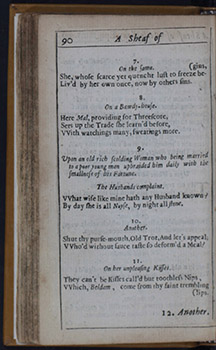 90
A Sheaf of
7.
90
A Sheaf of
7. On the same. She, whose scarce yet quencht lust to freeze begins, Liv'd by her own once, now by others sins. 8.
On a Bawdy-house. Here Mal, providing for Threescore, Sets up the Trade she learn'd before, VVithWith watchings many, sweatings more. 9.
Upon an old rich scolding Woman who being married
to a poor young man upbraided him daily with the
smallness of his Fortune.
The Husbands complaint. VVhatWhat wife like mine hath any Husband known? By day she is all Noyse, by night all stone. 10.
Another. Shut thy purse-mouth, Old Trot, And let's appeal; VVho'dWho'd without sauce taste so deform'd a Meal? 11.
On her unpleasing Kisses. They can't be Kisses call'd but toothless Nips, VVhichWhich, Beldam, come from thy faint trembling lips.
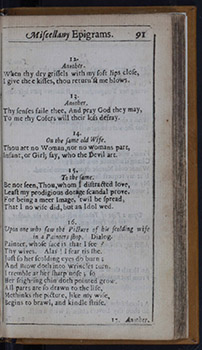 Miscellany Epigrams.
91
12.
Miscellany Epigrams.
91
12. Another. When thy dry grissels with my soft lips close, I give thee kisses, thou return'st me blows. 13.
Another. Thy senses faile thee, And pray God they may, To me thy Cofers will their loss defray. 14.
On the same old Wife. Thou art no Woman, nor no womans part, Infant, or Girl; say, who the Devil art. 15.
To the same. Be not seen, Thou, whom I distracted love, Least my prodigious dotage scandal prove. For being a meer Image, 'twil be spread, That I no wife did, but an Idol wed. 16.
Upon one who saw the Picture of his scolding wife
in a Painters shop. Dialog. Painter, whose face is that I see? Thy wives. Alas! I fear tis she. Just so her scolding eyes do burn; And Brow doth into wrincles turn. I tremble at her sharp nose; so Her frighting chin doth pointed grow. All parts are so drawn to the life, Methinks the picture, like my wise, Begins to brawl, and kindle strife.
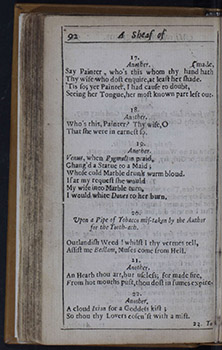 92
A Sheaf of
17.
92
A Sheaf of
17. Another. Say Painter, who's this whom thy hand hath made, Thy wife who dost enquire, at least her shade. 'Tis so; yet Painter, I had cause to doubt, Seeing her Tongue, her most known part left out. 18.
Another. Who's this, Painter? Thy wife, O That she were in earnest so. 19.
Another. Venus, when Pygmalion praid, Chang'd a Statue to a Maid; Whose cold Marble drunk warm bloud. If at my request she would My wife into Marble turn, I would white Doves to her burn. 20.
Upon a Pipe of Tobacco mis-taken by the Author
for the Tooth-ach. Outlandish Weed! whilst I thy vertues tell, Assist me Bedlam, Muses come from Hell. 21.
Another. An Hearb thou art, but useless; for made fire, From hot mouths puft, thou dost in fumes expire. 22.
Another. A cloud Ixion for a Goddess kist; So thou thy Lovers cosen'st with a mist.
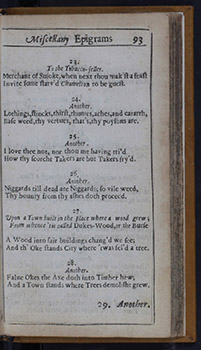 Miscellany Epigrams.
93
23.
Miscellany Epigrams.
93
23. To the Tobacco-seller. Merchant of Smoke, when next thou mak'st a feast Invite some starv'd Chamelion to be guest. 24.
Another. Lothings, stincks, thirst, rhumes, aches, and catarrh, Base weed, thy vertues, that's, thy poysons are. 25.
Another. I love thee not, nor thou me having tri'd How thy scorcht Takers are but Takers fry'd. 26.
Another. Niggards till dead are Niggards; so vile weed, Thy bounty from thy ashes doth proceed. 27.
Upon a Town built in the place where a wood grew;
From whence 'tis called Dukes-Wood, or the Burse A Wood into fair buildings chang'd we see; And th' Oke stands City where 'twas fel'd a tree. 28.
Another. Falne Okes the Axe doth into Timber hew; And a Town stands where Trees demolisht grew.
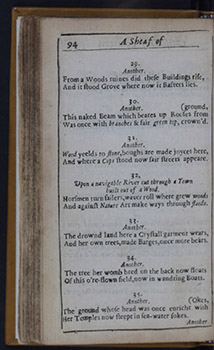 94
A Sheaf of
29.
94
A Sheaf of
29. Another. From a Woods ruines did these Buildings rise, And it stood Grove where now it Rafters lies. 30.
Another. This naked Beam which beares up Roofes from ground, Was once with branches & fair green top, crown'd. 31.
Another. Wood yeelds to stone, boughs are made joyces here, And where a Cops stood now fair streets appeare. 32.
Upon a navigable River cut through a Town
built out of a Wood. Horsmen turn sailers, waves roll where grew woods And against Nature Art make ways through floods. 33.
Another. The drownd land here a Crystall garment wears, And her own trees, made Barges, once more bears. 34.
Another. The tree her womb-bred on the back now floats Of this o're-flown field, now in wandring Boats. 35.
Another. The ground whose head was once enricht with Okes, Her Temples now steept in sea-water sokes.
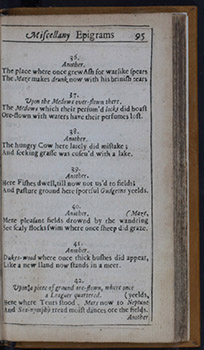 Miscellany Epigrams.
95
36.
Miscellany Epigrams.
95
36. Another. The place where once grew Ash for warlike spears The Maze makes drunk now with his brinish tears 37.
Upon the Medows over-flown there. The Medows which their perfum'd locks did boast Ore-flown with waters have their perfumes lost. 38.
Another. The hungry Cow here lately did mistake; And seeking grasse was cosen'd with a lake. 39.
Another. Here Fishes dwell, till now not us'd to fields; And pasture ground here sportful Gudgeons yeelds. 40.
Another. Mere pleasant fields drownd by the wandring Maze, See scaly flocks swim where once sheep did graze. 41.
Another. Dukes-wood where once thick bushes did appear, Like a new Iland now stands in a meer. 42.
Upon a piece of ground ore-flown, where once
a Leaguer quartered. Here where Tents stood, Mars now to Neptune yeelds, And Sea-nymphs tread moist dances ore the fields.
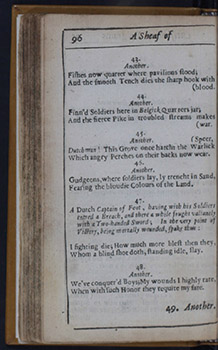 96
A Sheaf of
43.
96
A Sheaf of
43. Another. Fishes now quarter where pavilions stood; And the smooth Tench dies the sharp hook with blood. 44.
Another. Finn'd Soldiers here in Belgick Quarters jar; And the fierce Pike in troubled streams makes war. 45.
Another. Dutchman! This Grove once hatcht the Warlick Speer, Which angry Perches on their backs now wear. 46.
Another. Gudgeons, where soldiers lay, ly trencht in Sand, Fearing the bloudie Colours of the Land. 47.
A Dutch Captain of Foot, having with his Soldiers
entred a Breach, and there a while fought valiantly
with a Two-handed Sword; In the very point of
Victory, being mortally wounded, spake thus: I fighting die; How much more blest then they, Whom a blind shot doth, standing idle, slay. 48.
Another. We've conquer'd Boys; My wounds I highly rate, When with such Honor they requite my fate.
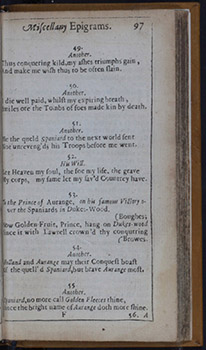 Miscellany Epigrams.
97
49.
Miscellany Epigrams.
97
49. Another. Thus conquering kild, my ashes triumphs gain, And make me wish thus to be often slain. 50.
Another. I die well paid, whilst my expiring breath, Smiles ore the Tombs of foes made kin by death. 51.
Another. Me the queld Spaniard to the next world sent Not unreveng'd; his Troops before me went. 52.
His Will. Let Heaven my soul, the foe my life, the grave My corps, my fame let my sav'd Countrey have. 53.
To the Prince of Aurange, on his famous Victory o-
ver the Spaniards in Dukes-Wood. Now Golden Fruit, Prince, hang on Dukes-wood Boughes; Since it with Lawrell crown'd thy conquering Browes. 54.
Another. Holland and Aurange may their Conquest boast Of the quell'd Spaniard, but brave Aurange most. 55.
Another. Spaniard, no more call Golden Fleeces thine, Since the bright name of Aurange doth more shine.
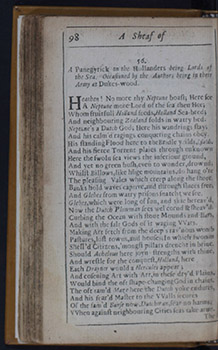 98
A Sheaf of
56.
98
A Sheaf of
56.
A Panegyrick on the Hollanders being Lords of
the Sea. Occasioned by the Authors being in their
Army at Dukes-wood. Heathen! No more thy Neptune boast; Here see A Neptune more Lord of the sea then Hee; Whom fruitfull Holland feeds, Holland Sea-bred; And neighbouring Zealand folds in watry bed. Neptune's a Dutch God; Here his wandrings stay; And his calm'd ragings conring chains obey. His standing Flood here to the Bridle yeilds, And his fierce Torrent plaies through unknown fields. Here the swoln sea views the inferiour ground, And yet no green bush, even to wonder, drownd; Whilst Billows, like huge mountains, do hang o're The pleasing Vales which creep along the shore. Banks hold waves captive, and through sluces free, And Glebes from watry prisons snatcht we see. Glebes, which were long of sun, and skie bereav'd, Now the Dutch Plowman sees wel cornd & sheav'd. Curbing the Ocean with stout Mounds and Bars, And with the salt Gods of it waging VVarsWars. Making Art fetch from the deep's rav'nous womb Pastures, lost towns, and houses; In which swomm Shell'd Citizens,' mongst pillars drencht in brine. Should Achelous here joyn strengths with thine, And wrestle for the conquest, Holland, here Each Drayner would a Hercules appear; And cosening Art with Art, in these dry'd Plains, Would bind the oft shape-changing God in chains. The oft tam'd Maze here the Dutch yoke endures, And his fear'd Master to the VVallsWalls secures Of the sam'd Burse now, Dutchman, fear no harms, VVhenWhen against neighbouring Cities seas take arms.
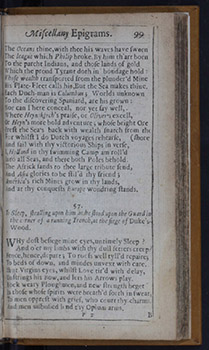 Miscellany Epigrams.
99
The Oceans thine, with thee his waves have sworn
The league which Philip broke. By him th'art born
To the parcht Indians, and those lands of gold
Which the proud Tyrant doth in bondage hold:
Whose wealth transported from the plunder'd Mine
His Plate-Fleet calls his, But the Sea makes thine.
Each Duch-man is Columbus; Worlds unknown
To the discovering Spaniard, are his grown:
Nor can I here conceal, nor yet say well,
Where Heynskirch's praise, or Oliver's excell,
Or Heyn's more bold adventure; whose bright Ore
Prest the Sea's back with wealth snatch from the shore
For whilst I do Dutch voyages rehearse,
And sail with thy victorious Ships in verse,
I, Holland in thy swimming Camp am roll'd
Into all Seas, and there both Poles behold.
The Africk sands to thee large tribute send,
And Asia glories to be stil'd thy friend;
America's rich Mines grow in thy lands,
And at thy conquests Europe wondring stands.
57.
Miscellany Epigrams.
99
The Oceans thine, with thee his waves have sworn
The league which Philip broke. By him th'art born
To the parcht Indians, and those lands of gold
Which the proud Tyrant doth in bondage hold:
Whose wealth transported from the plunder'd Mine
His Plate-Fleet calls his, But the Sea makes thine.
Each Duch-man is Columbus; Worlds unknown
To the discovering Spaniard, are his grown:
Nor can I here conceal, nor yet say well,
Where Heynskirch's praise, or Oliver's excell,
Or Heyn's more bold adventure; whose bright Ore
Prest the Sea's back with wealth snatch from the shore
For whilst I do Dutch voyages rehearse,
And sail with thy victorious Ships in verse,
I, Holland in thy swimming Camp am roll'd
Into all Seas, and there both Poles behold.
The Africk sands to thee large tribute send,
And Asia glories to be stil'd thy friend;
America's rich Mines grow in thy lands,
And at thy conquests Europe wondring stands.
57.
To Sleep, stealling upon him as he stood upon the Guard in
the corner of a running Trench, at the siege of Duke's-Wood. WHyWhy dost besiege mine eyes, untimely Sleep? And o'er my limbs with thy dull setters creep? Hence, hence, depart; To roofs well tyll'd repaire; To beds of down, and mindes unvext with care. Shut Virgins eyes, whilst Love tir'd with delay, Unstrings his Bow, and lets his Arrows play. Rock weary Ploughmen, and new strength beget In those whose spirits were breath'd forth in sweat; To men opprest with grief, who court thy charms. And men unbusied lend thy Opium arms.
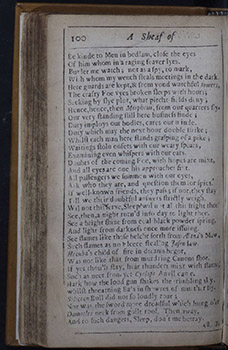 100
A Sheaf of
Be kinde to Men in bedlam, close the eyes
Of him who in a raging feaver lyes.
But let me watch; not as a spy, to mark,
With whom my wench steals meetings in the dark.
Here guards are kept, & from yond watchful towres,
The crasty Foe vyes broken: sleeps with ours;
Seeking by slye plots, what pitcht-fields deny;
Hence, hence, then Morpheus, from our quarters fly.
Our very standing still here business finde;
Duty imploys our bodies, cares our minde.
Duty which may the next hour double strike;
Whilst each man here stands grasping of a pike;
Waitings stoln onsets with our weary spears,
Examining even whispers with our ears.
Doubts of the coming Foe, with hopes are mixt,
And all eyes are one his approaches fit.
All passengers we summon with our eyes,
Ask who they are, and question them or spies.
If well-known friends, they pass; if not, they stay
Till we their doubtful answers strictly weigh.
Wil not this serve, Sleep? wil not al this fright thee?
See, then, a night turn'd into day to light thee.
See a bright shine from coal black powder spring,
And light from darkness once more issuing.
See flames like those belcht forth from Aetna's Maw,
Such flames as no Fleece-stealing Iason saw.
Hecuba's child of fire in dreams begot,
Was not like that from murdring Canons shot.
If yet thou'lt stay, hear thunders mixt with flame,
Such as neer yet from Cyclops Anvil came.
Hark how the loud gun shakes the trembling sky,
whilst threatning Bals in showres of murther fly.
Sicilian Bull did not so loudly roar;
Nor was the sword more dreadful which hung o're
Damocles neck from guilt roof. Then, away,
And to such dangers, Sleep, don't me betray.
100
A Sheaf of
Be kinde to Men in bedlam, close the eyes
Of him who in a raging feaver lyes.
But let me watch; not as a spy, to mark,
With whom my wench steals meetings in the dark.
Here guards are kept, & from yond watchful towres,
The crasty Foe vyes broken: sleeps with ours;
Seeking by slye plots, what pitcht-fields deny;
Hence, hence, then Morpheus, from our quarters fly.
Our very standing still here business finde;
Duty imploys our bodies, cares our minde.
Duty which may the next hour double strike;
Whilst each man here stands grasping of a pike;
Waitings stoln onsets with our weary spears,
Examining even whispers with our ears.
Doubts of the coming Foe, with hopes are mixt,
And all eyes are one his approaches fit.
All passengers we summon with our eyes,
Ask who they are, and question them or spies.
If well-known friends, they pass; if not, they stay
Till we their doubtful answers strictly weigh.
Wil not this serve, Sleep? wil not al this fright thee?
See, then, a night turn'd into day to light thee.
See a bright shine from coal black powder spring,
And light from darkness once more issuing.
See flames like those belcht forth from Aetna's Maw,
Such flames as no Fleece-stealing Iason saw.
Hecuba's child of fire in dreams begot,
Was not like that from murdring Canons shot.
If yet thou'lt stay, hear thunders mixt with flame,
Such as neer yet from Cyclops Anvil came.
Hark how the loud gun shakes the trembling sky,
whilst threatning Bals in showres of murther fly.
Sicilian Bull did not so loudly roar;
Nor was the sword more dreadful which hung o're
Damocles neck from guilt roof. Then, away,
And to such dangers, Sleep, don't me betray.
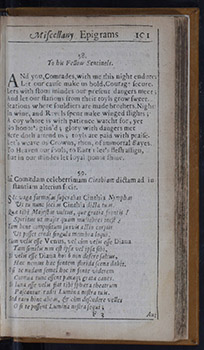 Miscellany Epigrams.
101
58.
Miscellany Epigrams.
101
58. To his Fellow Sentinels. ANdAnd you, Comrades, with me this night endure; Let our cause make us bold, Courage secure. Lets with stout mindes our present dangers meet; And let our stations from their toyls grow sweet. Stations where souldiers are made brothers. Night In wine, and Revels spent make winged flights; A coy whore is with patience watcht for, yet No honor's gain'd; glory with dangers met Here doth attend us; toyls are paid with praise. Let's weave us Crowns, then, of immortal Bayes. To Heaven our souls, to Earth let's flesh assign, But in our mindes let loyal honor shine. 59.
In Comædam celeberrimam Cinthiam dictam ad in
stantiam alterius fcit. SIcSic vaga formosas superabat Cinthia Nymphas Ut tu nunc socias Cinthia dicta tuas. Quae tibi Majestas vultus, que gratia frontis! Spiritus ut major quam muliebris inest? Tam bene compositum suavis decet actio corpus Ut posset credi singula membra loqui. Cùm velis esse Venus, vel cùm velis esse Diana Tam sunilis non est ipsa vel ipsa sibi, Si velis esse Diana hos ô non desere saltus, Haec nemus haec fontem florida scena dabit. O si te nudam semel hoc in fonte viderem Cornua tunc essent paenaq;que grata canes. Si Luna esse velis fiat tibi sphaera theatrum, Pascantur radiis Lumina nostra tuis. Sed raro hinc abeas, & cùm discedere velles O si te possent Lumina nostra sequi;
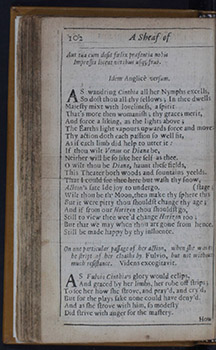 102
A Sheaf of
Aut tua cum desit foelix praesentia nobis
Impressis liceat viribus usq;que srui.
Idem Anglicè versum.
ASAs wandring Cinthia all her Nymphs excells,
So dost thou all thy fellows; In thee dwells
Majesty mixt with loveliness, a spirit
That's more then womanish; thy graces merit,
And force a liking, as the lights above;
The Earths light vapours upwards force and move:
Thy action doth each passion so well fit,
As if each limb did help to utter it:
If thou wilt Venus or Diana be,
Neither will be so like her self as thee.
thou be Diana, haunt these fields,
both woods and fountains yeelds.
That I could see thee here but wash thy snow,
Acteon's fate Ide joy to undergo.
Wilt thou be th' Moon, then make thy sphere this stage;
But it were pitty thou shouldst change thy age;
And if from our Horizon thou shouldst go,
Still to view thee wee'd change Horizon too;
But that we may when thou art gone from hence,
Still be made happy by thy influence.
On one particular passage of her action, when she was to be stript of her cloaths by Fulvio, but not without much resistance. Videns excogitavit.
ASAs Fulvio Cinthia's glory would eclips,
And graced by her limbs, her robe off strips;
To see her how she strove, and pray'd, and cry'd,
But for the plays sake none could have deny'd.
And as she strove with him, so modesty
Did strive with anger for the mastery.
102
A Sheaf of
Aut tua cum desit foelix praesentia nobis
Impressis liceat viribus usq;que srui.
Idem Anglicè versum.
ASAs wandring Cinthia all her Nymphs excells,
So dost thou all thy fellows; In thee dwells
Majesty mixt with loveliness, a spirit
That's more then womanish; thy graces merit,
And force a liking, as the lights above;
The Earths light vapours upwards force and move:
Thy action doth each passion so well fit,
As if each limb did help to utter it:
If thou wilt Venus or Diana be,
Neither will be so like her self as thee.
thou be Diana, haunt these fields,
both woods and fountains yeelds.
That I could see thee here but wash thy snow,
Acteon's fate Ide joy to undergo.
Wilt thou be th' Moon, then make thy sphere this stage;
But it were pitty thou shouldst change thy age;
And if from our Horizon thou shouldst go,
Still to view thee wee'd change Horizon too;
But that we may when thou art gone from hence,
Still be made happy by thy influence.
On one particular passage of her action, when she was to be stript of her cloaths by Fulvio, but not without much resistance. Videns excogitavit.
ASAs Fulvio Cinthia's glory would eclips,
And graced by her limbs, her robe off strips;
To see her how she strove, and pray'd, and cry'd,
But for the plays sake none could have deny'd.
And as she strove with him, so modesty
Did strive with anger for the mastery.
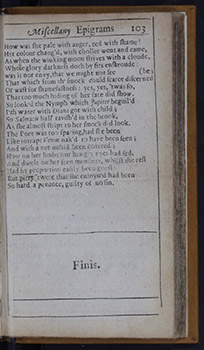 Miscellany Epigrams.
103
How was she pale with anger, red with shame!
Her colour chang'd, with choller went and came,
As when the winking moon strives with a cloude,
Whose glory darkness doth by fits enshroude:
was it nor envy, that we might not see
That which from th' smock could scarce discerned be;
Or wast for shamefastness: yes, yes, 'twas so,
That too much hiding of her face did show.
So look'd the Nymph which Iupiter beguil'd
I'th water with Diana got with child;
So Salmacis half ravish'd in the brook,
As she almost stript to her smock did look.
The Poet was too sparing, had she been
Like intrapt Venus nak'd to have been seen;
And with a net unhid been covered;
How on her limbs our hungry eyes had fed,
And dwelt on her seen members, whilst the rest
Had by proportion easily been guest:
But pitty 'twere that she enjoyn'd had been
So hard a penance, guilty of no sin.
Finis.
Miscellany Epigrams.
103
How was she pale with anger, red with shame!
Her colour chang'd, with choller went and came,
As when the winking moon strives with a cloude,
Whose glory darkness doth by fits enshroude:
was it nor envy, that we might not see
That which from th' smock could scarce discerned be;
Or wast for shamefastness: yes, yes, 'twas so,
That too much hiding of her face did show.
So look'd the Nymph which Iupiter beguil'd
I'th water with Diana got with child;
So Salmacis half ravish'd in the brook,
As she almost stript to her smock did look.
The Poet was too sparing, had she been
Like intrapt Venus nak'd to have been seen;
And with a net unhid been covered;
How on her limbs our hungry eyes had fed,
And dwelt on her seen members, whilst the rest
Had by proportion easily been guest:
But pitty 'twere that she enjoyn'd had been
So hard a penance, guilty of no sin.
Finis.